Managerial Skills and Leadership Development
VerifiedAdded on 2020/01/28
|28
|4160
|52
Essay
AI Summary
This assignment delves into the crucial aspects of management and leadership in contemporary organizations. It examines various leadership styles, management theories, and practical applications for developing effective managers. The text references a range of scholarly articles and publications that provide insights into topics such as crisis communication, organizational change, self-managed development, motivation, and business ethics within a leadership context. Students are encouraged to analyze these concepts and their implications for successful management practices.
Contribute Materials
Your contribution can guide someone’s learning journey. Share your
documents today.
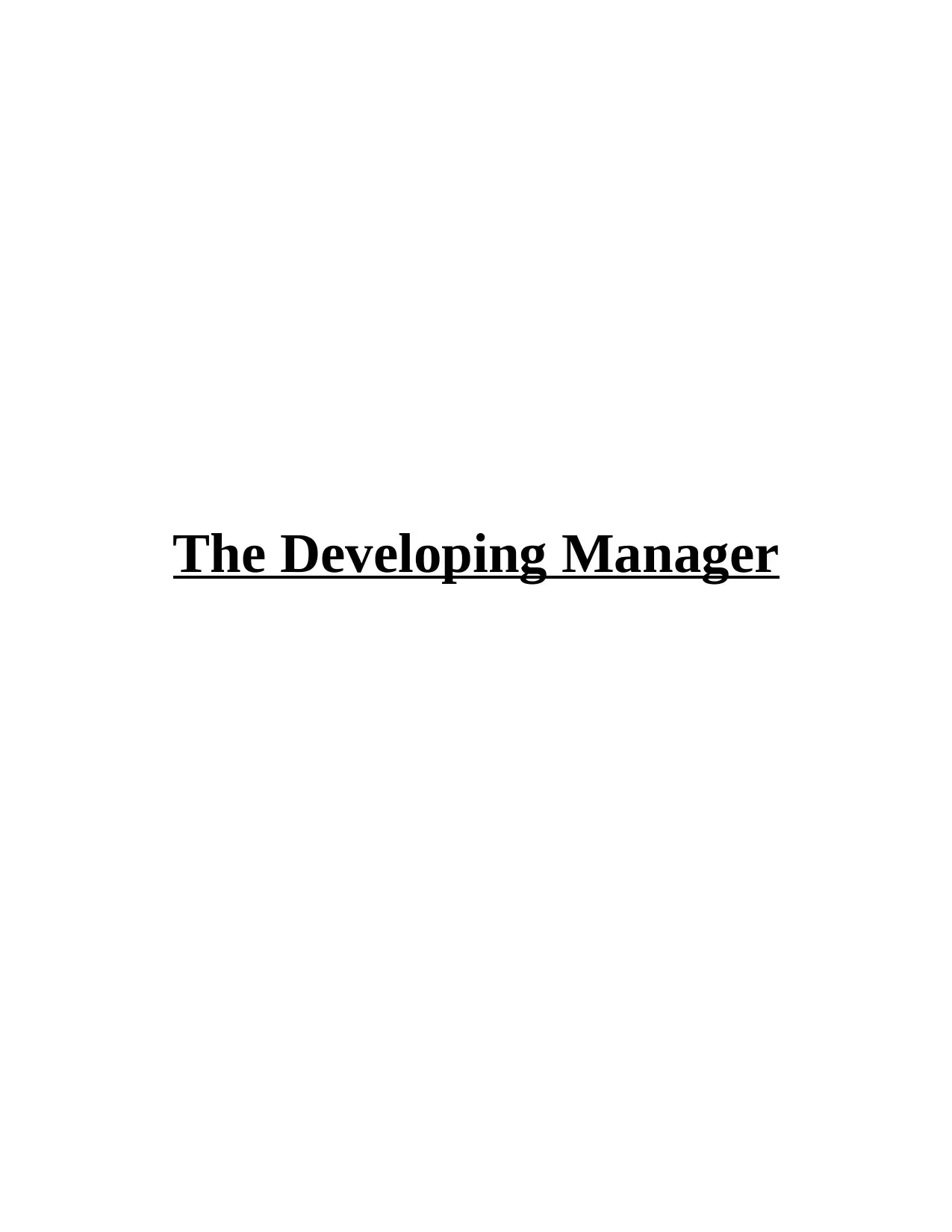
The Developing Manager
Secure Best Marks with AI Grader
Need help grading? Try our AI Grader for instant feedback on your assignments.
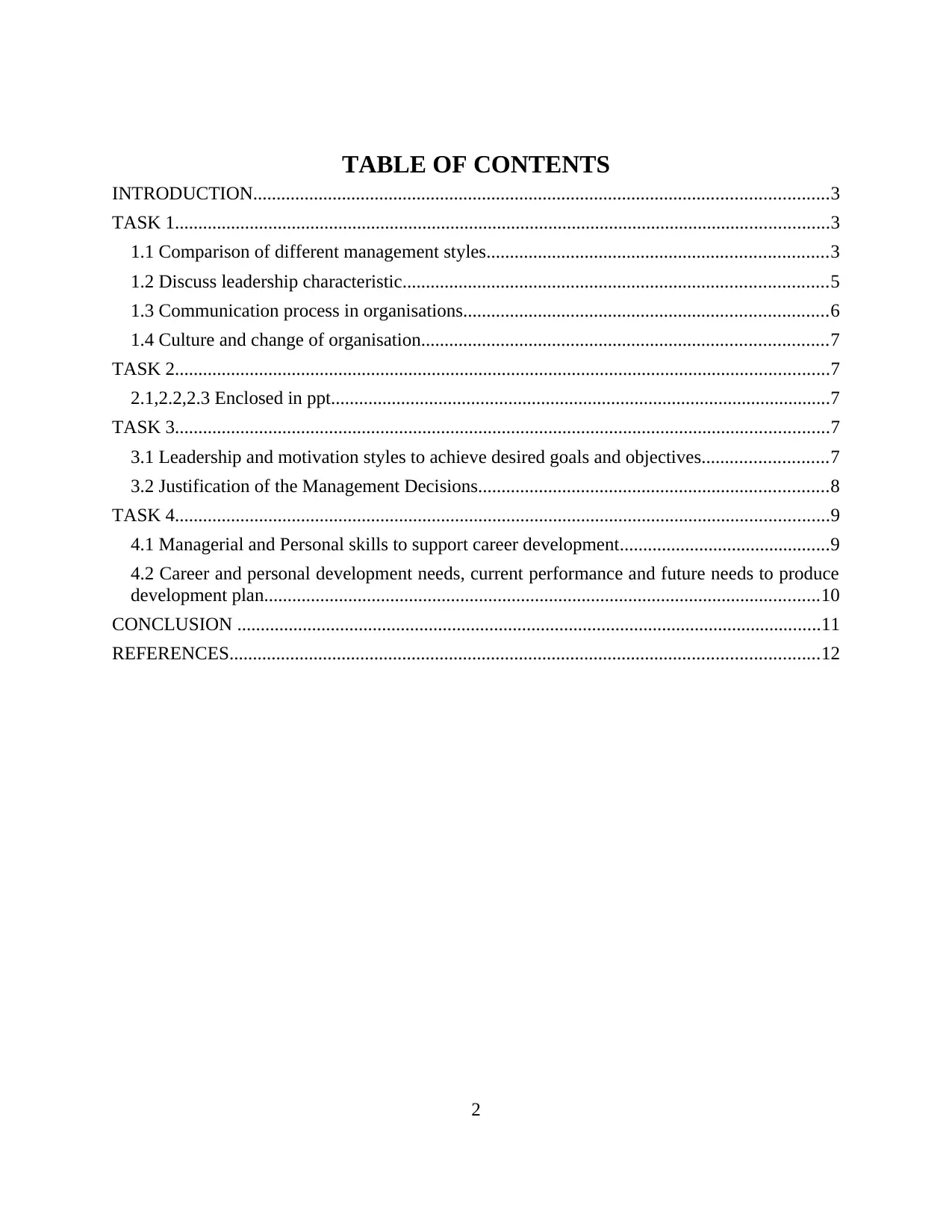
TABLE OF CONTENTS
INTRODUCTION...........................................................................................................................3
TASK 1............................................................................................................................................3
1.1 Comparison of different management styles.........................................................................3
1.2 Discuss leadership characteristic...........................................................................................5
1.3 Communication process in organisations..............................................................................6
1.4 Culture and change of organisation.......................................................................................7
TASK 2............................................................................................................................................7
2.1,2.2,2.3 Enclosed in ppt...........................................................................................................7
TASK 3............................................................................................................................................7
3.1 Leadership and motivation styles to achieve desired goals and objectives...........................7
3.2 Justification of the Management Decisions...........................................................................8
TASK 4............................................................................................................................................9
4.1 Managerial and Personal skills to support career development.............................................9
4.2 Career and personal development needs, current performance and future needs to produce
development plan.......................................................................................................................10
CONCLUSION .............................................................................................................................11
REFERENCES..............................................................................................................................12
2
INTRODUCTION...........................................................................................................................3
TASK 1............................................................................................................................................3
1.1 Comparison of different management styles.........................................................................3
1.2 Discuss leadership characteristic...........................................................................................5
1.3 Communication process in organisations..............................................................................6
1.4 Culture and change of organisation.......................................................................................7
TASK 2............................................................................................................................................7
2.1,2.2,2.3 Enclosed in ppt...........................................................................................................7
TASK 3............................................................................................................................................7
3.1 Leadership and motivation styles to achieve desired goals and objectives...........................7
3.2 Justification of the Management Decisions...........................................................................8
TASK 4............................................................................................................................................9
4.1 Managerial and Personal skills to support career development.............................................9
4.2 Career and personal development needs, current performance and future needs to produce
development plan.......................................................................................................................10
CONCLUSION .............................................................................................................................11
REFERENCES..............................................................................................................................12
2
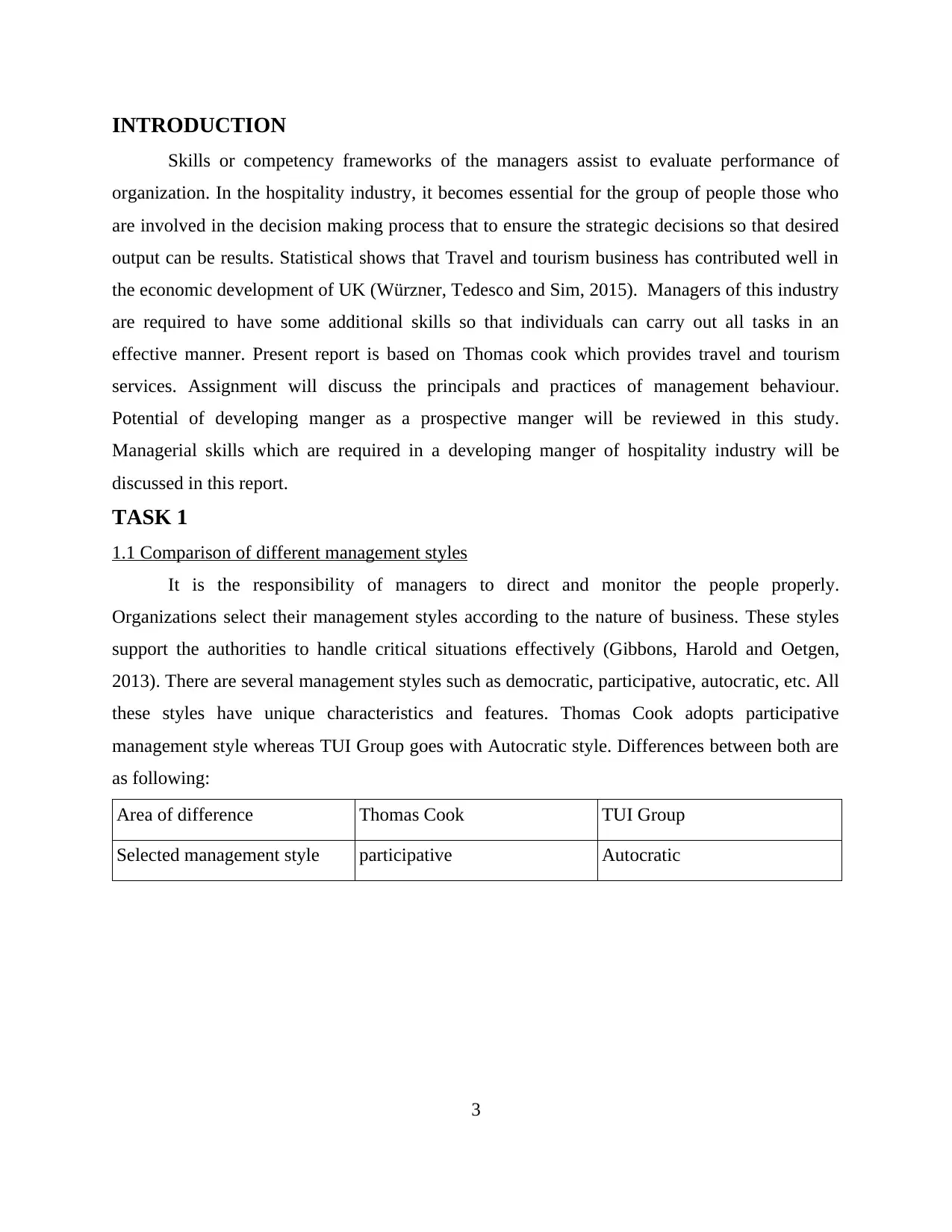
INTRODUCTION
Skills or competency frameworks of the managers assist to evaluate performance of
organization. In the hospitality industry, it becomes essential for the group of people those who
are involved in the decision making process that to ensure the strategic decisions so that desired
output can be results. Statistical shows that Travel and tourism business has contributed well in
the economic development of UK (Würzner, Tedesco and Sim, 2015). Managers of this industry
are required to have some additional skills so that individuals can carry out all tasks in an
effective manner. Present report is based on Thomas cook which provides travel and tourism
services. Assignment will discuss the principals and practices of management behaviour.
Potential of developing manger as a prospective manger will be reviewed in this study.
Managerial skills which are required in a developing manger of hospitality industry will be
discussed in this report.
TASK 1
1.1 Comparison of different management styles
It is the responsibility of managers to direct and monitor the people properly.
Organizations select their management styles according to the nature of business. These styles
support the authorities to handle critical situations effectively (Gibbons, Harold and Oetgen,
2013). There are several management styles such as democratic, participative, autocratic, etc. All
these styles have unique characteristics and features. Thomas Cook adopts participative
management style whereas TUI Group goes with Autocratic style. Differences between both are
as following:
Area of difference Thomas Cook TUI Group
Selected management style participative Autocratic
3
Skills or competency frameworks of the managers assist to evaluate performance of
organization. In the hospitality industry, it becomes essential for the group of people those who
are involved in the decision making process that to ensure the strategic decisions so that desired
output can be results. Statistical shows that Travel and tourism business has contributed well in
the economic development of UK (Würzner, Tedesco and Sim, 2015). Managers of this industry
are required to have some additional skills so that individuals can carry out all tasks in an
effective manner. Present report is based on Thomas cook which provides travel and tourism
services. Assignment will discuss the principals and practices of management behaviour.
Potential of developing manger as a prospective manger will be reviewed in this study.
Managerial skills which are required in a developing manger of hospitality industry will be
discussed in this report.
TASK 1
1.1 Comparison of different management styles
It is the responsibility of managers to direct and monitor the people properly.
Organizations select their management styles according to the nature of business. These styles
support the authorities to handle critical situations effectively (Gibbons, Harold and Oetgen,
2013). There are several management styles such as democratic, participative, autocratic, etc. All
these styles have unique characteristics and features. Thomas Cook adopts participative
management style whereas TUI Group goes with Autocratic style. Differences between both are
as following:
Area of difference Thomas Cook TUI Group
Selected management style participative Autocratic
3
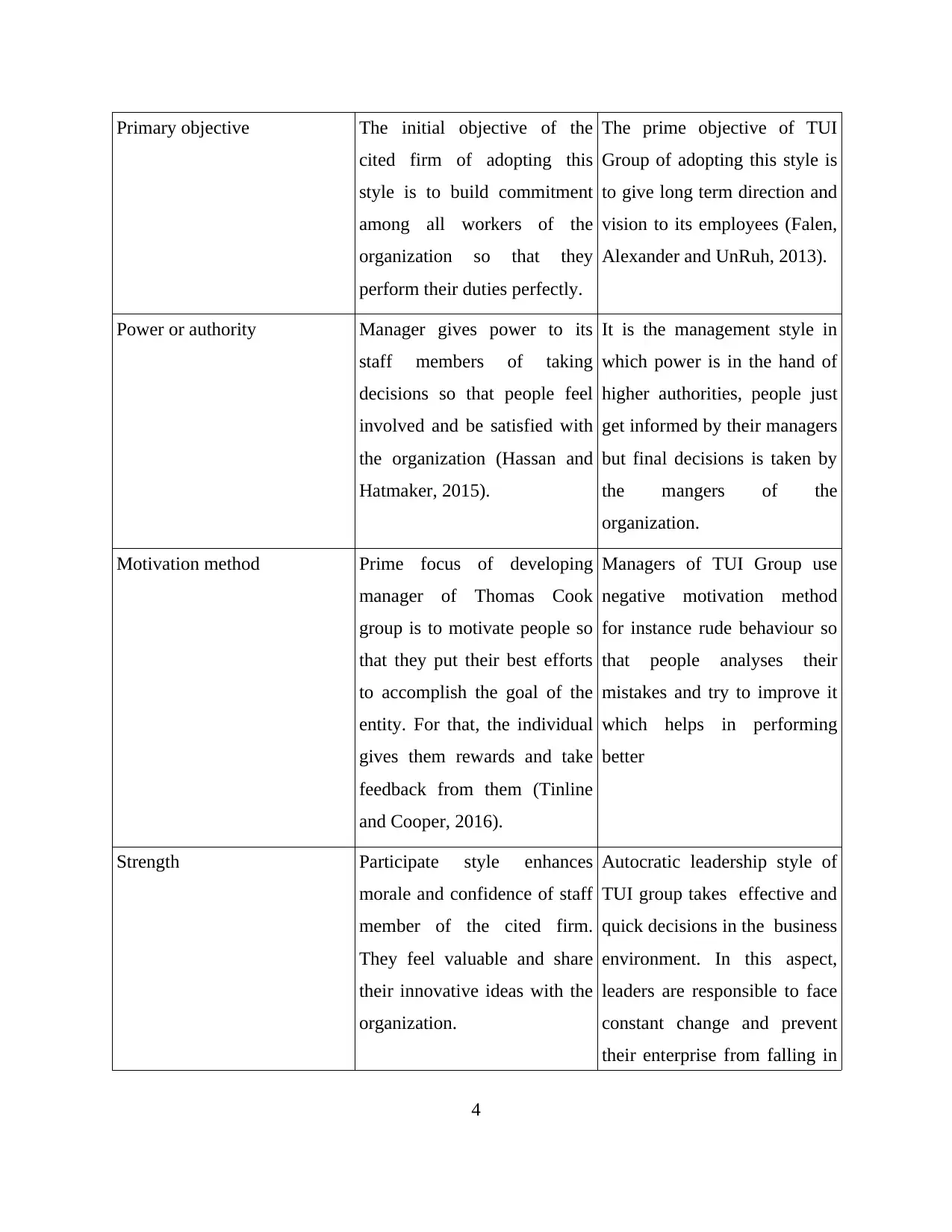
Primary objective The initial objective of the
cited firm of adopting this
style is to build commitment
among all workers of the
organization so that they
perform their duties perfectly.
The prime objective of TUI
Group of adopting this style is
to give long term direction and
vision to its employees (Falen,
Alexander and UnRuh, 2013).
Power or authority Manager gives power to its
staff members of taking
decisions so that people feel
involved and be satisfied with
the organization (Hassan and
Hatmaker, 2015).
It is the management style in
which power is in the hand of
higher authorities, people just
get informed by their managers
but final decisions is taken by
the mangers of the
organization.
Motivation method Prime focus of developing
manager of Thomas Cook
group is to motivate people so
that they put their best efforts
to accomplish the goal of the
entity. For that, the individual
gives them rewards and take
feedback from them (Tinline
and Cooper, 2016).
Managers of TUI Group use
negative motivation method
for instance rude behaviour so
that people analyses their
mistakes and try to improve it
which helps in performing
better
Strength Participate style enhances
morale and confidence of staff
member of the cited firm.
They feel valuable and share
their innovative ideas with the
organization.
Autocratic leadership style of
TUI group takes effective and
quick decisions in the business
environment. In this aspect,
leaders are responsible to face
constant change and prevent
their enterprise from falling in
4
cited firm of adopting this
style is to build commitment
among all workers of the
organization so that they
perform their duties perfectly.
The prime objective of TUI
Group of adopting this style is
to give long term direction and
vision to its employees (Falen,
Alexander and UnRuh, 2013).
Power or authority Manager gives power to its
staff members of taking
decisions so that people feel
involved and be satisfied with
the organization (Hassan and
Hatmaker, 2015).
It is the management style in
which power is in the hand of
higher authorities, people just
get informed by their managers
but final decisions is taken by
the mangers of the
organization.
Motivation method Prime focus of developing
manager of Thomas Cook
group is to motivate people so
that they put their best efforts
to accomplish the goal of the
entity. For that, the individual
gives them rewards and take
feedback from them (Tinline
and Cooper, 2016).
Managers of TUI Group use
negative motivation method
for instance rude behaviour so
that people analyses their
mistakes and try to improve it
which helps in performing
better
Strength Participate style enhances
morale and confidence of staff
member of the cited firm.
They feel valuable and share
their innovative ideas with the
organization.
Autocratic leadership style of
TUI group takes effective and
quick decisions in the business
environment. In this aspect,
leaders are responsible to face
constant change and prevent
their enterprise from falling in
4
Secure Best Marks with AI Grader
Need help grading? Try our AI Grader for instant feedback on your assignments.
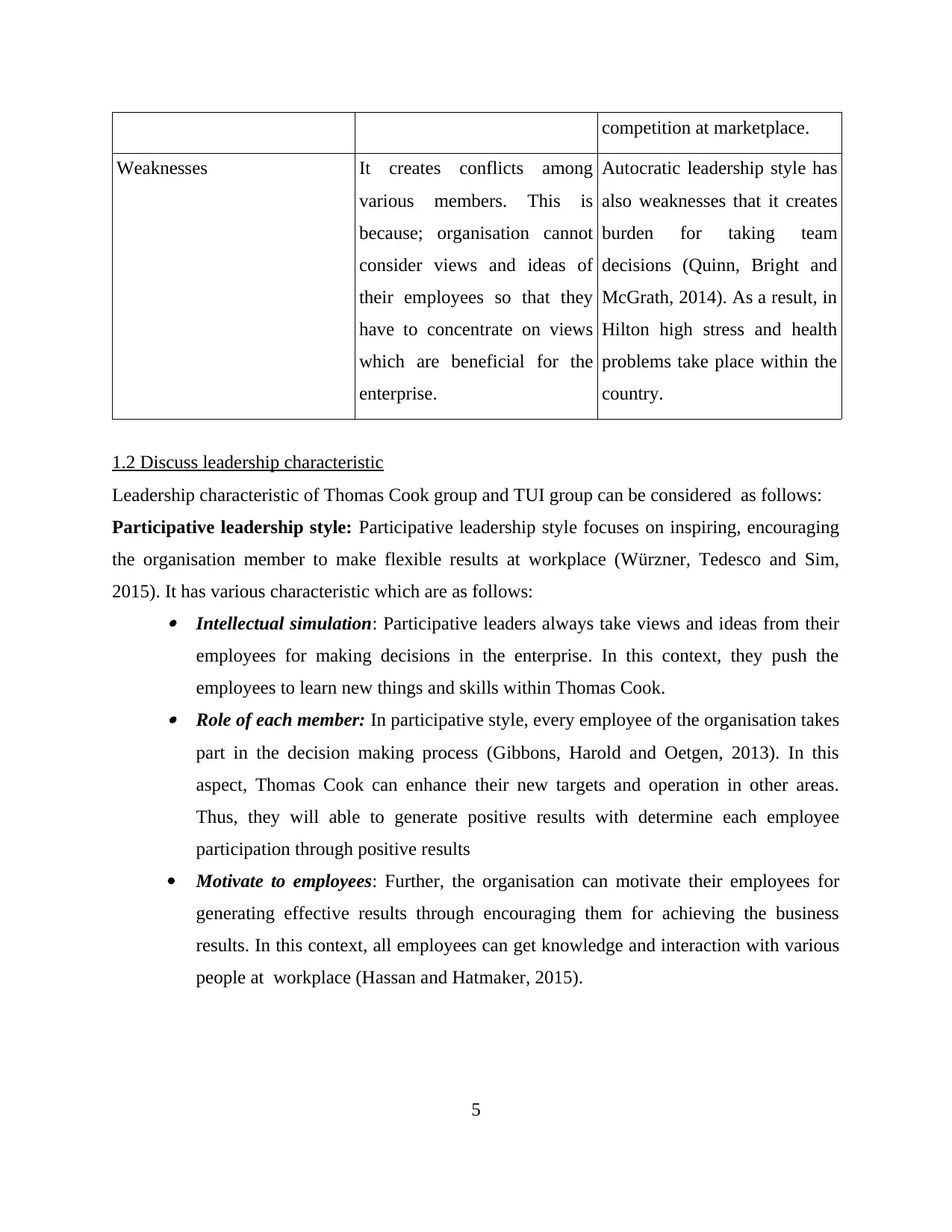
competition at marketplace.
Weaknesses It creates conflicts among
various members. This is
because; organisation cannot
consider views and ideas of
their employees so that they
have to concentrate on views
which are beneficial for the
enterprise.
Autocratic leadership style has
also weaknesses that it creates
burden for taking team
decisions (Quinn, Bright and
McGrath, 2014). As a result, in
Hilton high stress and health
problems take place within the
country.
1.2 Discuss leadership characteristic
Leadership characteristic of Thomas Cook group and TUI group can be considered as follows:
Participative leadership style: Participative leadership style focuses on inspiring, encouraging
the organisation member to make flexible results at workplace (Würzner, Tedesco and Sim,
2015). It has various characteristic which are as follows:
Intellectual simulation: Participative leaders always take views and ideas from their
employees for making decisions in the enterprise. In this context, they push the
employees to learn new things and skills within Thomas Cook.
Role of each member: In participative style, every employee of the organisation takes
part in the decision making process (Gibbons, Harold and Oetgen, 2013). In this
aspect, Thomas Cook can enhance their new targets and operation in other areas.
Thus, they will able to generate positive results with determine each employee
participation through positive results
Motivate to employees: Further, the organisation can motivate their employees for
generating effective results through encouraging them for achieving the business
results. In this context, all employees can get knowledge and interaction with various
people at workplace (Hassan and Hatmaker, 2015).
5
Weaknesses It creates conflicts among
various members. This is
because; organisation cannot
consider views and ideas of
their employees so that they
have to concentrate on views
which are beneficial for the
enterprise.
Autocratic leadership style has
also weaknesses that it creates
burden for taking team
decisions (Quinn, Bright and
McGrath, 2014). As a result, in
Hilton high stress and health
problems take place within the
country.
1.2 Discuss leadership characteristic
Leadership characteristic of Thomas Cook group and TUI group can be considered as follows:
Participative leadership style: Participative leadership style focuses on inspiring, encouraging
the organisation member to make flexible results at workplace (Würzner, Tedesco and Sim,
2015). It has various characteristic which are as follows:
Intellectual simulation: Participative leaders always take views and ideas from their
employees for making decisions in the enterprise. In this context, they push the
employees to learn new things and skills within Thomas Cook.
Role of each member: In participative style, every employee of the organisation takes
part in the decision making process (Gibbons, Harold and Oetgen, 2013). In this
aspect, Thomas Cook can enhance their new targets and operation in other areas.
Thus, they will able to generate positive results with determine each employee
participation through positive results
Motivate to employees: Further, the organisation can motivate their employees for
generating effective results through encouraging them for achieving the business
results. In this context, all employees can get knowledge and interaction with various
people at workplace (Hassan and Hatmaker, 2015).
5
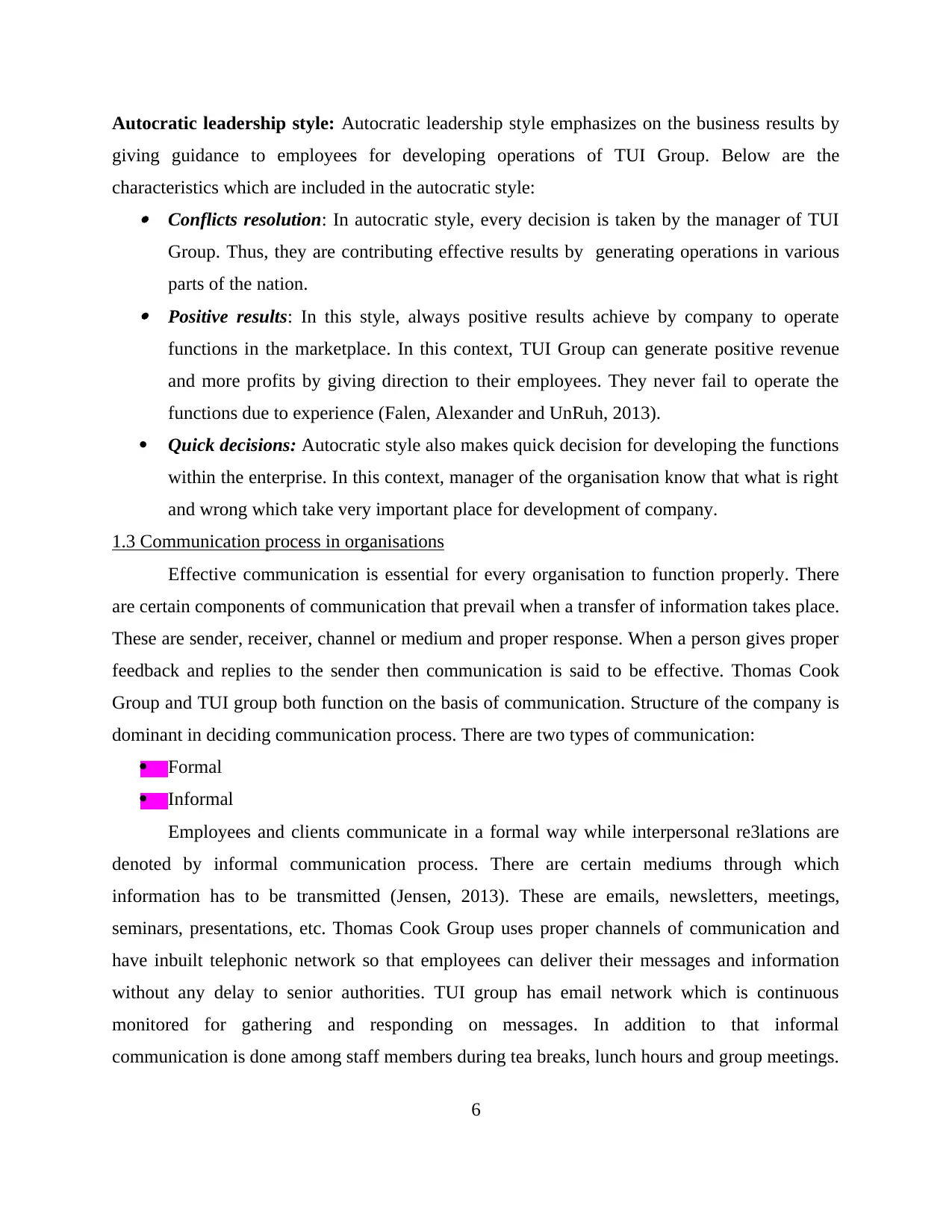
Autocratic leadership style: Autocratic leadership style emphasizes on the business results by
giving guidance to employees for developing operations of TUI Group. Below are the
characteristics which are included in the autocratic style: Conflicts resolution: In autocratic style, every decision is taken by the manager of TUI
Group. Thus, they are contributing effective results by generating operations in various
parts of the nation. Positive results: In this style, always positive results achieve by company to operate
functions in the marketplace. In this context, TUI Group can generate positive revenue
and more profits by giving direction to their employees. They never fail to operate the
functions due to experience (Falen, Alexander and UnRuh, 2013).
Quick decisions: Autocratic style also makes quick decision for developing the functions
within the enterprise. In this context, manager of the organisation know that what is right
and wrong which take very important place for development of company.
1.3 Communication process in organisations
Effective communication is essential for every organisation to function properly. There
are certain components of communication that prevail when a transfer of information takes place.
These are sender, receiver, channel or medium and proper response. When a person gives proper
feedback and replies to the sender then communication is said to be effective. Thomas Cook
Group and TUI group both function on the basis of communication. Structure of the company is
dominant in deciding communication process. There are two types of communication:
Formal
Informal
Employees and clients communicate in a formal way while interpersonal re3lations are
denoted by informal communication process. There are certain mediums through which
information has to be transmitted (Jensen, 2013). These are emails, newsletters, meetings,
seminars, presentations, etc. Thomas Cook Group uses proper channels of communication and
have inbuilt telephonic network so that employees can deliver their messages and information
without any delay to senior authorities. TUI group has email network which is continuous
monitored for gathering and responding on messages. In addition to that informal
communication is done among staff members during tea breaks, lunch hours and group meetings.
6
giving guidance to employees for developing operations of TUI Group. Below are the
characteristics which are included in the autocratic style: Conflicts resolution: In autocratic style, every decision is taken by the manager of TUI
Group. Thus, they are contributing effective results by generating operations in various
parts of the nation. Positive results: In this style, always positive results achieve by company to operate
functions in the marketplace. In this context, TUI Group can generate positive revenue
and more profits by giving direction to their employees. They never fail to operate the
functions due to experience (Falen, Alexander and UnRuh, 2013).
Quick decisions: Autocratic style also makes quick decision for developing the functions
within the enterprise. In this context, manager of the organisation know that what is right
and wrong which take very important place for development of company.
1.3 Communication process in organisations
Effective communication is essential for every organisation to function properly. There
are certain components of communication that prevail when a transfer of information takes place.
These are sender, receiver, channel or medium and proper response. When a person gives proper
feedback and replies to the sender then communication is said to be effective. Thomas Cook
Group and TUI group both function on the basis of communication. Structure of the company is
dominant in deciding communication process. There are two types of communication:
Formal
Informal
Employees and clients communicate in a formal way while interpersonal re3lations are
denoted by informal communication process. There are certain mediums through which
information has to be transmitted (Jensen, 2013). These are emails, newsletters, meetings,
seminars, presentations, etc. Thomas Cook Group uses proper channels of communication and
have inbuilt telephonic network so that employees can deliver their messages and information
without any delay to senior authorities. TUI group has email network which is continuous
monitored for gathering and responding on messages. In addition to that informal
communication is done among staff members during tea breaks, lunch hours and group meetings.
6
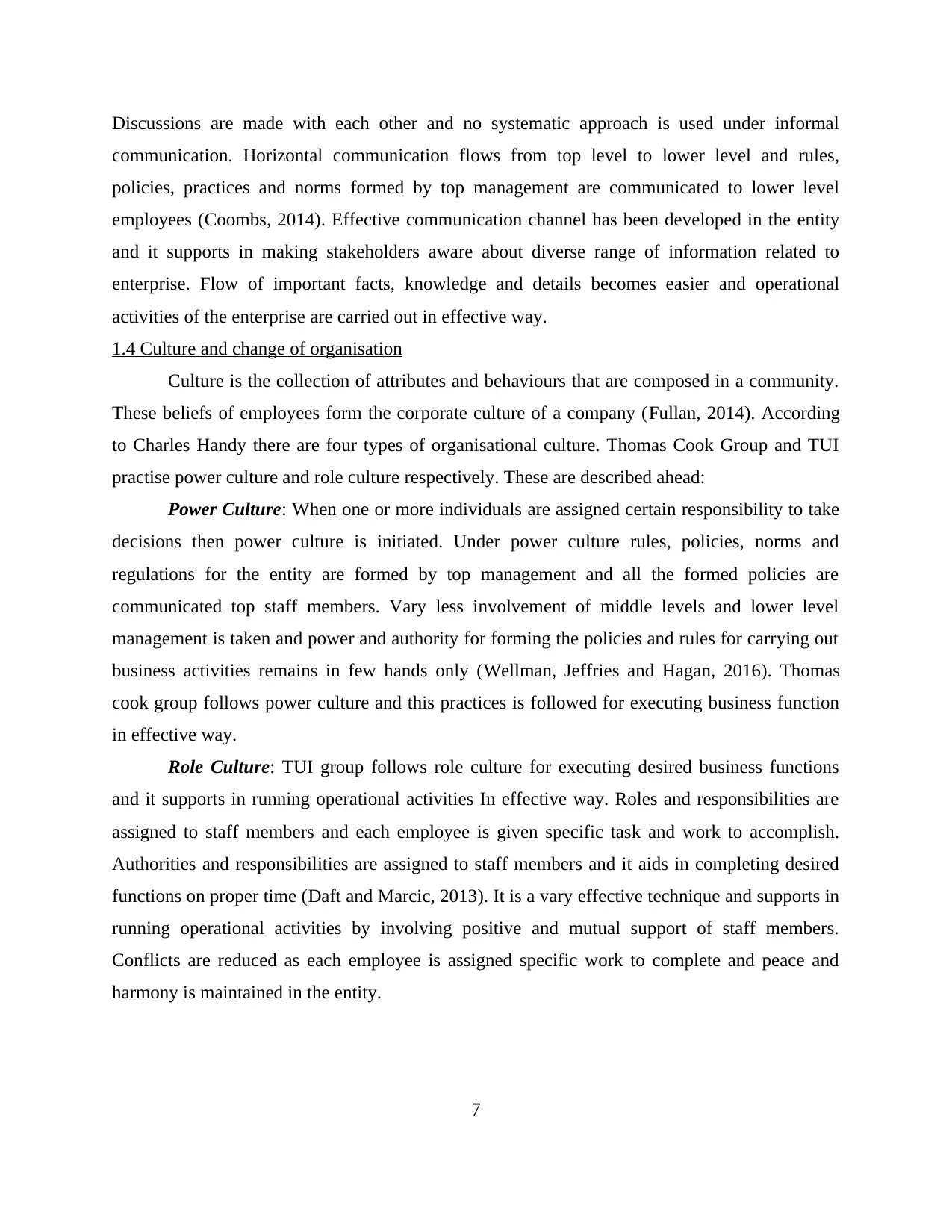
Discussions are made with each other and no systematic approach is used under informal
communication. Horizontal communication flows from top level to lower level and rules,
policies, practices and norms formed by top management are communicated to lower level
employees (Coombs, 2014). Effective communication channel has been developed in the entity
and it supports in making stakeholders aware about diverse range of information related to
enterprise. Flow of important facts, knowledge and details becomes easier and operational
activities of the enterprise are carried out in effective way.
1.4 Culture and change of organisation
Culture is the collection of attributes and behaviours that are composed in a community.
These beliefs of employees form the corporate culture of a company (Fullan, 2014). According
to Charles Handy there are four types of organisational culture. Thomas Cook Group and TUI
practise power culture and role culture respectively. These are described ahead:
Power Culture: When one or more individuals are assigned certain responsibility to take
decisions then power culture is initiated. Under power culture rules, policies, norms and
regulations for the entity are formed by top management and all the formed policies are
communicated top staff members. Vary less involvement of middle levels and lower level
management is taken and power and authority for forming the policies and rules for carrying out
business activities remains in few hands only (Wellman, Jeffries and Hagan, 2016). Thomas
cook group follows power culture and this practices is followed for executing business function
in effective way.
Role Culture: TUI group follows role culture for executing desired business functions
and it supports in running operational activities In effective way. Roles and responsibilities are
assigned to staff members and each employee is given specific task and work to accomplish.
Authorities and responsibilities are assigned to staff members and it aids in completing desired
functions on proper time (Daft and Marcic, 2013). It is a vary effective technique and supports in
running operational activities by involving positive and mutual support of staff members.
Conflicts are reduced as each employee is assigned specific work to complete and peace and
harmony is maintained in the entity.
7
communication. Horizontal communication flows from top level to lower level and rules,
policies, practices and norms formed by top management are communicated to lower level
employees (Coombs, 2014). Effective communication channel has been developed in the entity
and it supports in making stakeholders aware about diverse range of information related to
enterprise. Flow of important facts, knowledge and details becomes easier and operational
activities of the enterprise are carried out in effective way.
1.4 Culture and change of organisation
Culture is the collection of attributes and behaviours that are composed in a community.
These beliefs of employees form the corporate culture of a company (Fullan, 2014). According
to Charles Handy there are four types of organisational culture. Thomas Cook Group and TUI
practise power culture and role culture respectively. These are described ahead:
Power Culture: When one or more individuals are assigned certain responsibility to take
decisions then power culture is initiated. Under power culture rules, policies, norms and
regulations for the entity are formed by top management and all the formed policies are
communicated top staff members. Vary less involvement of middle levels and lower level
management is taken and power and authority for forming the policies and rules for carrying out
business activities remains in few hands only (Wellman, Jeffries and Hagan, 2016). Thomas
cook group follows power culture and this practices is followed for executing business function
in effective way.
Role Culture: TUI group follows role culture for executing desired business functions
and it supports in running operational activities In effective way. Roles and responsibilities are
assigned to staff members and each employee is given specific task and work to accomplish.
Authorities and responsibilities are assigned to staff members and it aids in completing desired
functions on proper time (Daft and Marcic, 2013). It is a vary effective technique and supports in
running operational activities by involving positive and mutual support of staff members.
Conflicts are reduced as each employee is assigned specific work to complete and peace and
harmony is maintained in the entity.
7
Paraphrase This Document
Need a fresh take? Get an instant paraphrase of this document with our AI Paraphraser
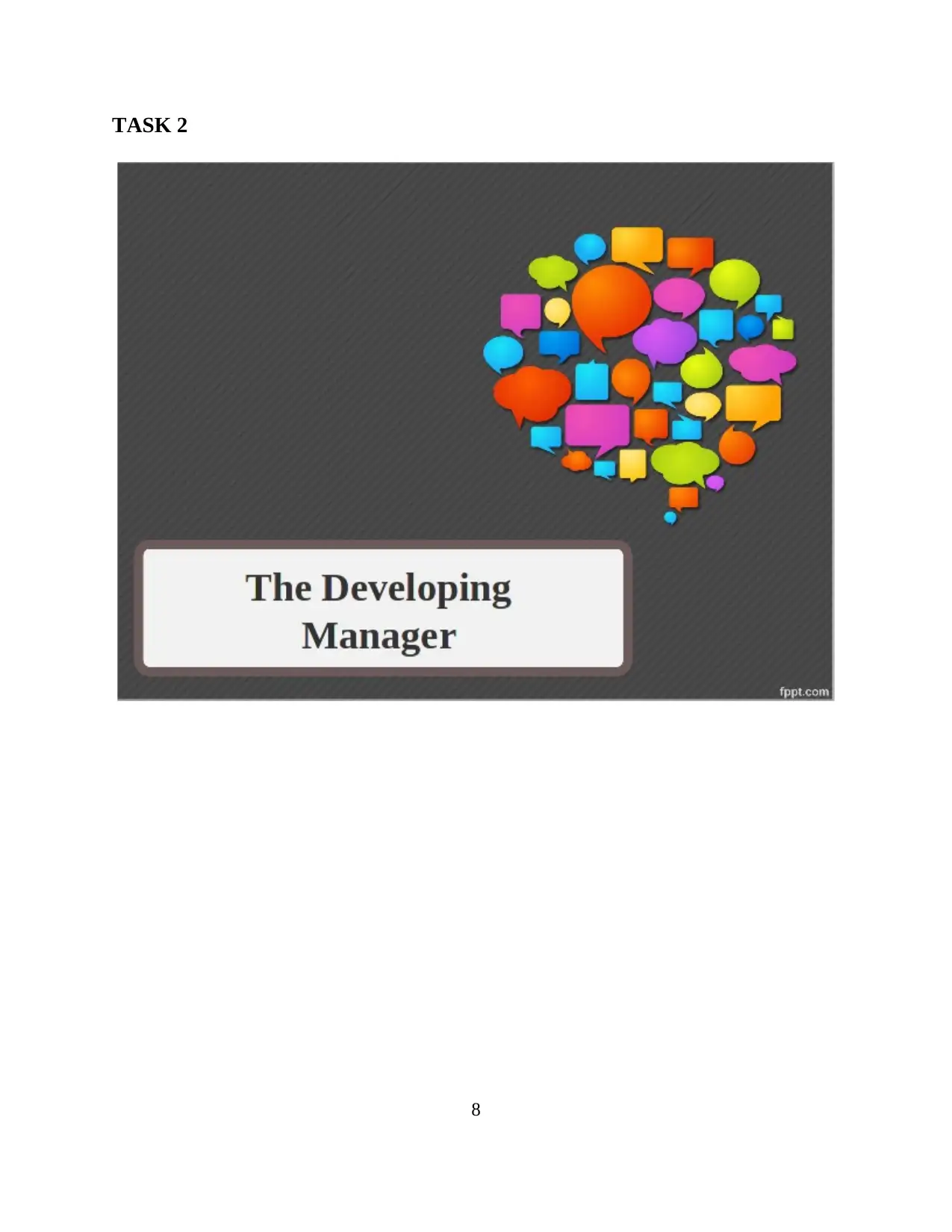
TASK 2
8
8
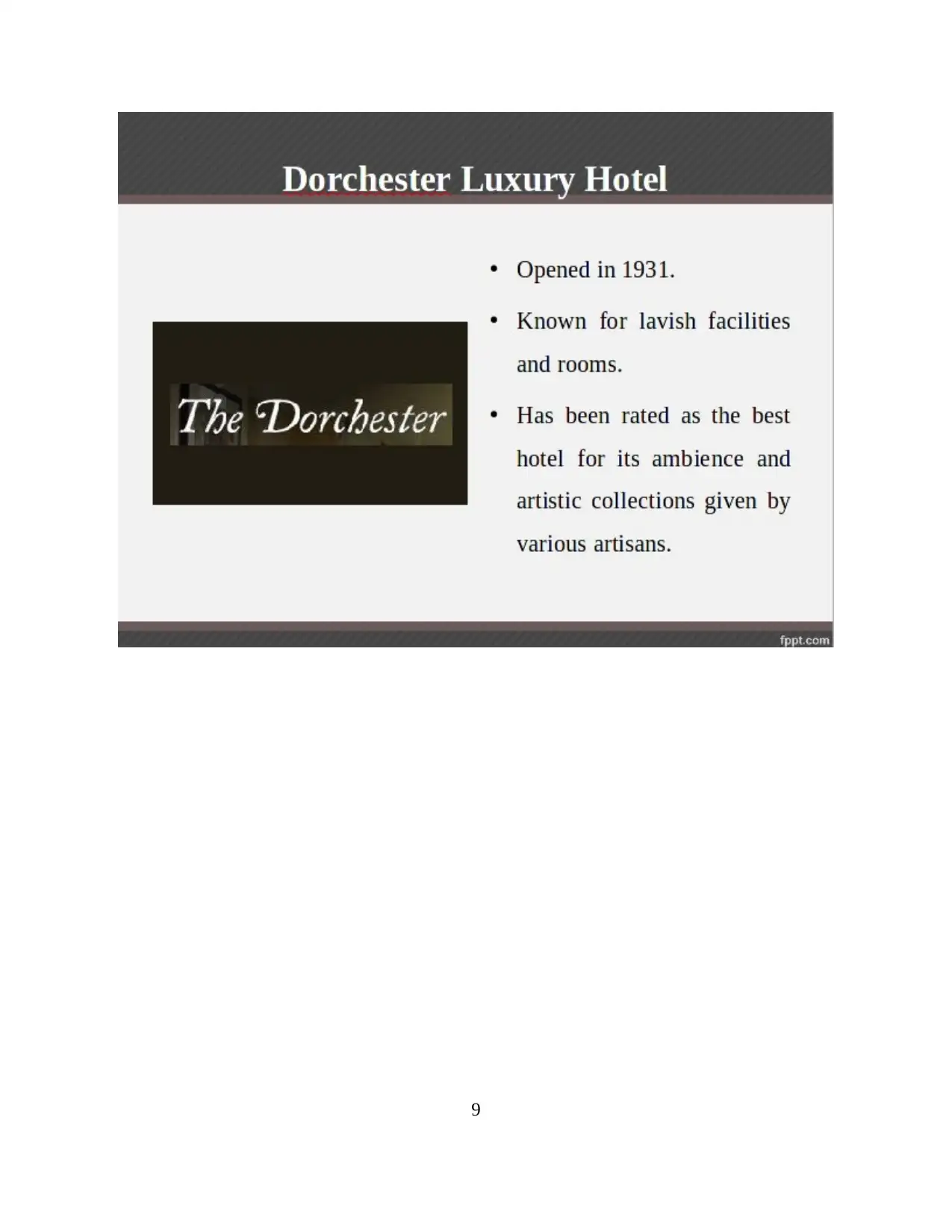
9
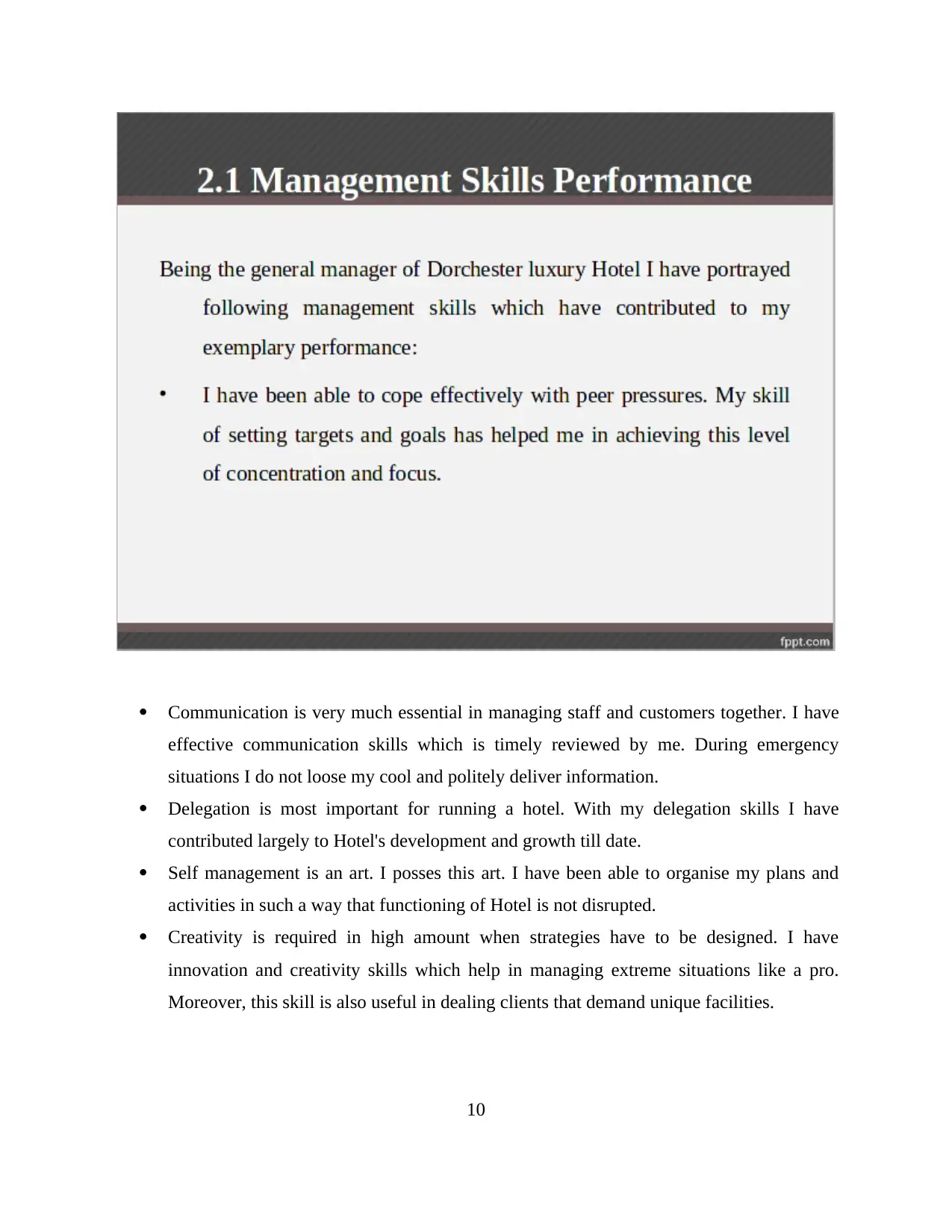
Communication is very much essential in managing staff and customers together. I have
effective communication skills which is timely reviewed by me. During emergency
situations I do not loose my cool and politely deliver information.
Delegation is most important for running a hotel. With my delegation skills I have
contributed largely to Hotel's development and growth till date.
Self management is an art. I posses this art. I have been able to organise my plans and
activities in such a way that functioning of Hotel is not disrupted.
Creativity is required in high amount when strategies have to be designed. I have
innovation and creativity skills which help in managing extreme situations like a pro.
Moreover, this skill is also useful in dealing clients that demand unique facilities.
10
effective communication skills which is timely reviewed by me. During emergency
situations I do not loose my cool and politely deliver information.
Delegation is most important for running a hotel. With my delegation skills I have
contributed largely to Hotel's development and growth till date.
Self management is an art. I posses this art. I have been able to organise my plans and
activities in such a way that functioning of Hotel is not disrupted.
Creativity is required in high amount when strategies have to be designed. I have
innovation and creativity skills which help in managing extreme situations like a pro.
Moreover, this skill is also useful in dealing clients that demand unique facilities.
10
Secure Best Marks with AI Grader
Need help grading? Try our AI Grader for instant feedback on your assignments.
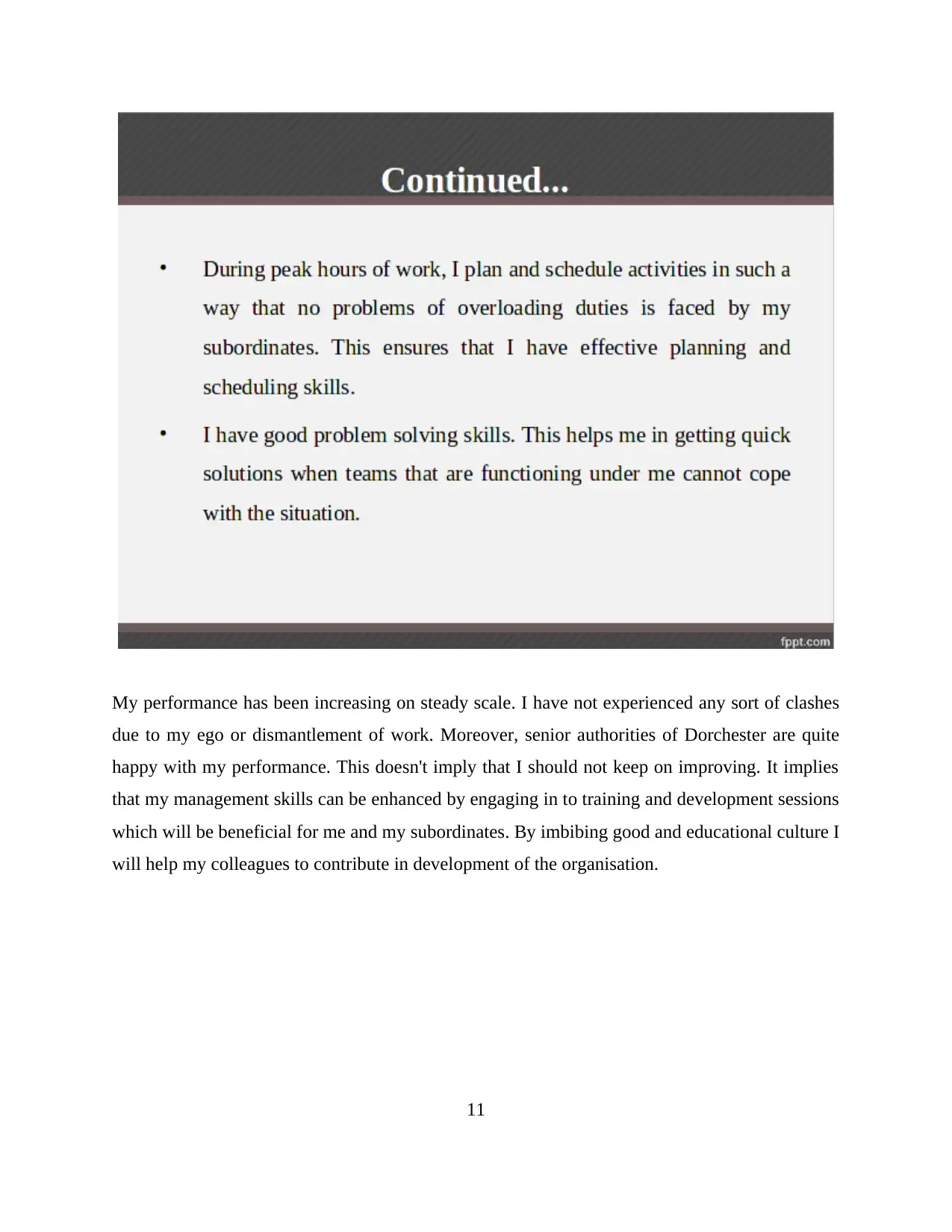
My performance has been increasing on steady scale. I have not experienced any sort of clashes
due to my ego or dismantlement of work. Moreover, senior authorities of Dorchester are quite
happy with my performance. This doesn't imply that I should not keep on improving. It implies
that my management skills can be enhanced by engaging in to training and development sessions
which will be beneficial for me and my subordinates. By imbibing good and educational culture I
will help my colleagues to contribute in development of the organisation.
11
due to my ego or dismantlement of work. Moreover, senior authorities of Dorchester are quite
happy with my performance. This doesn't imply that I should not keep on improving. It implies
that my management skills can be enhanced by engaging in to training and development sessions
which will be beneficial for me and my subordinates. By imbibing good and educational culture I
will help my colleagues to contribute in development of the organisation.
11
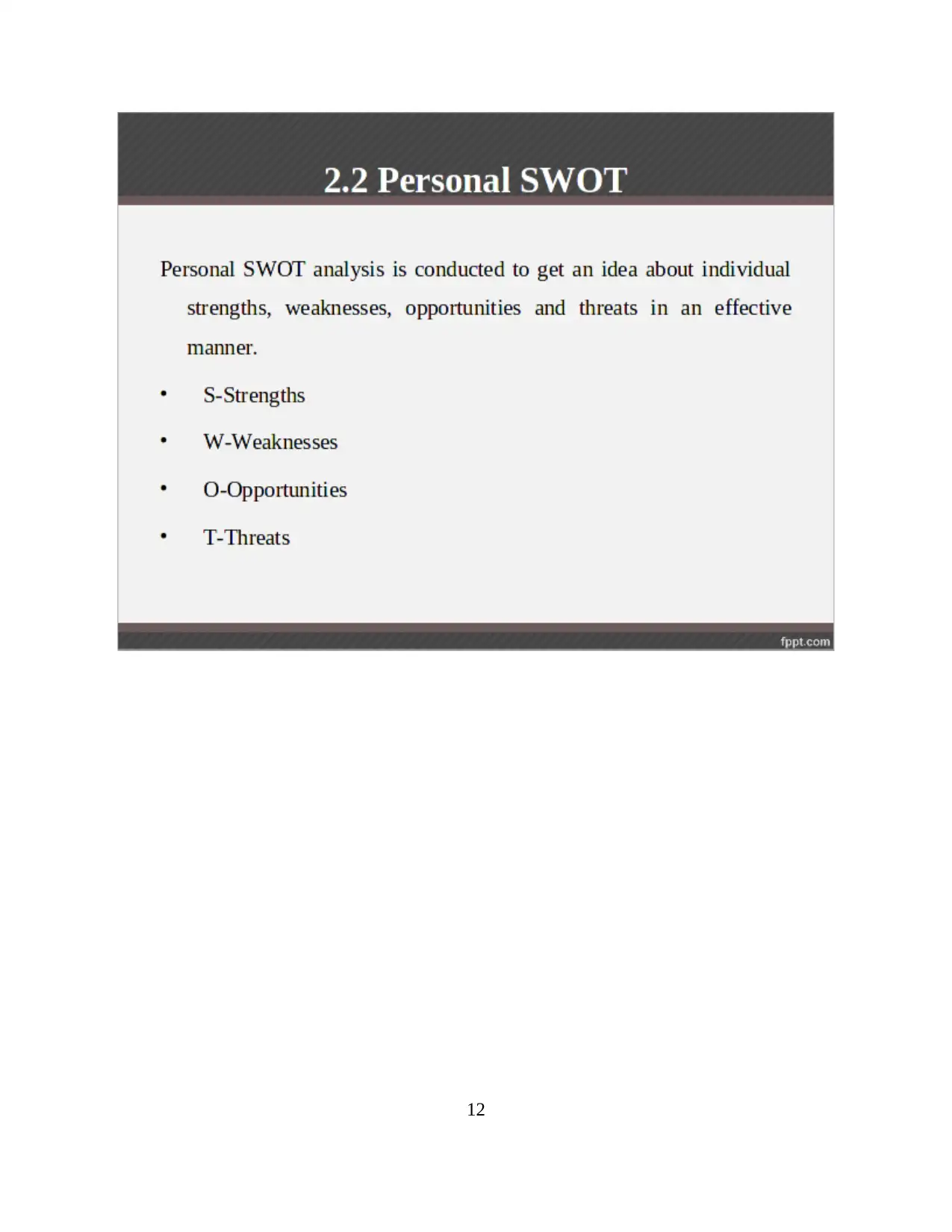
12
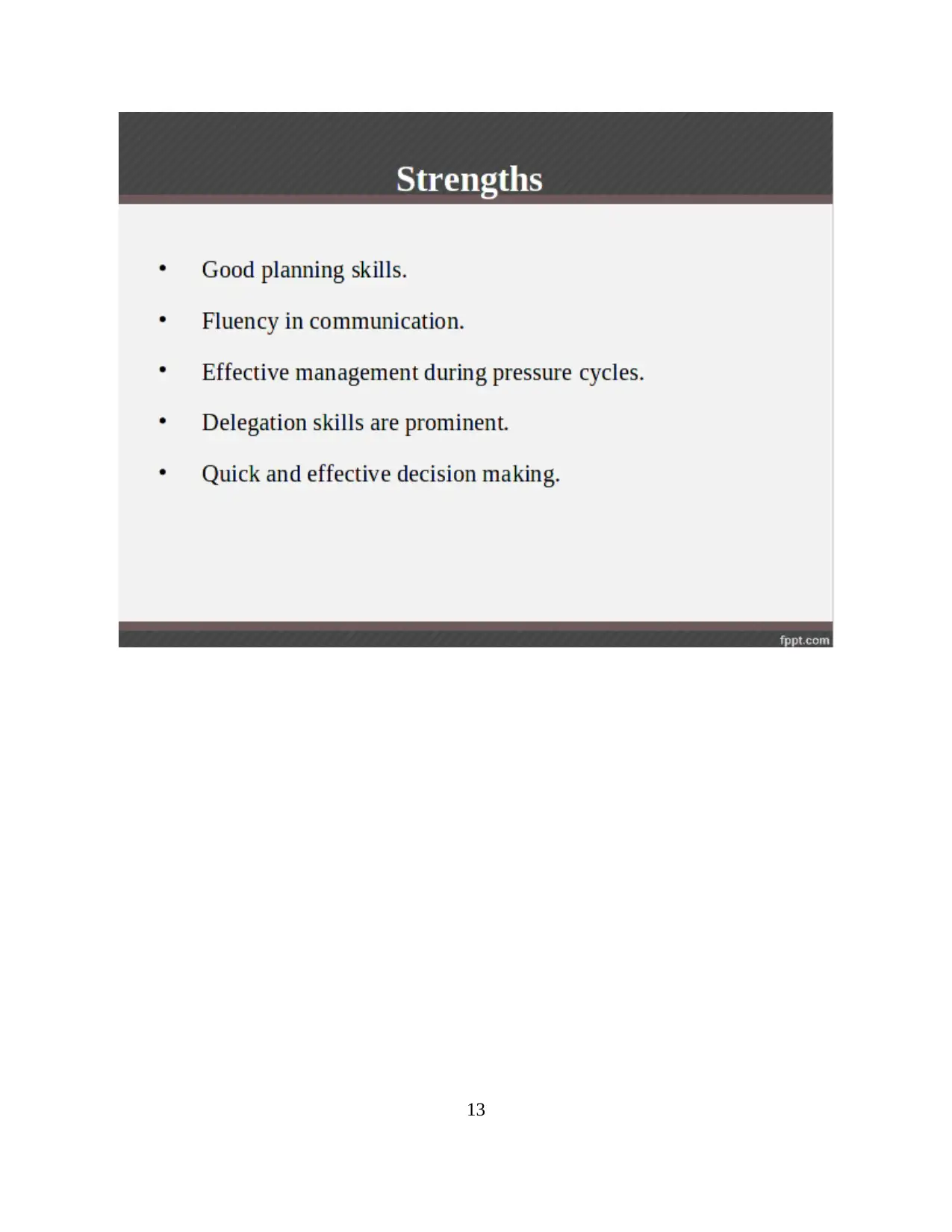
13
Paraphrase This Document
Need a fresh take? Get an instant paraphrase of this document with our AI Paraphraser
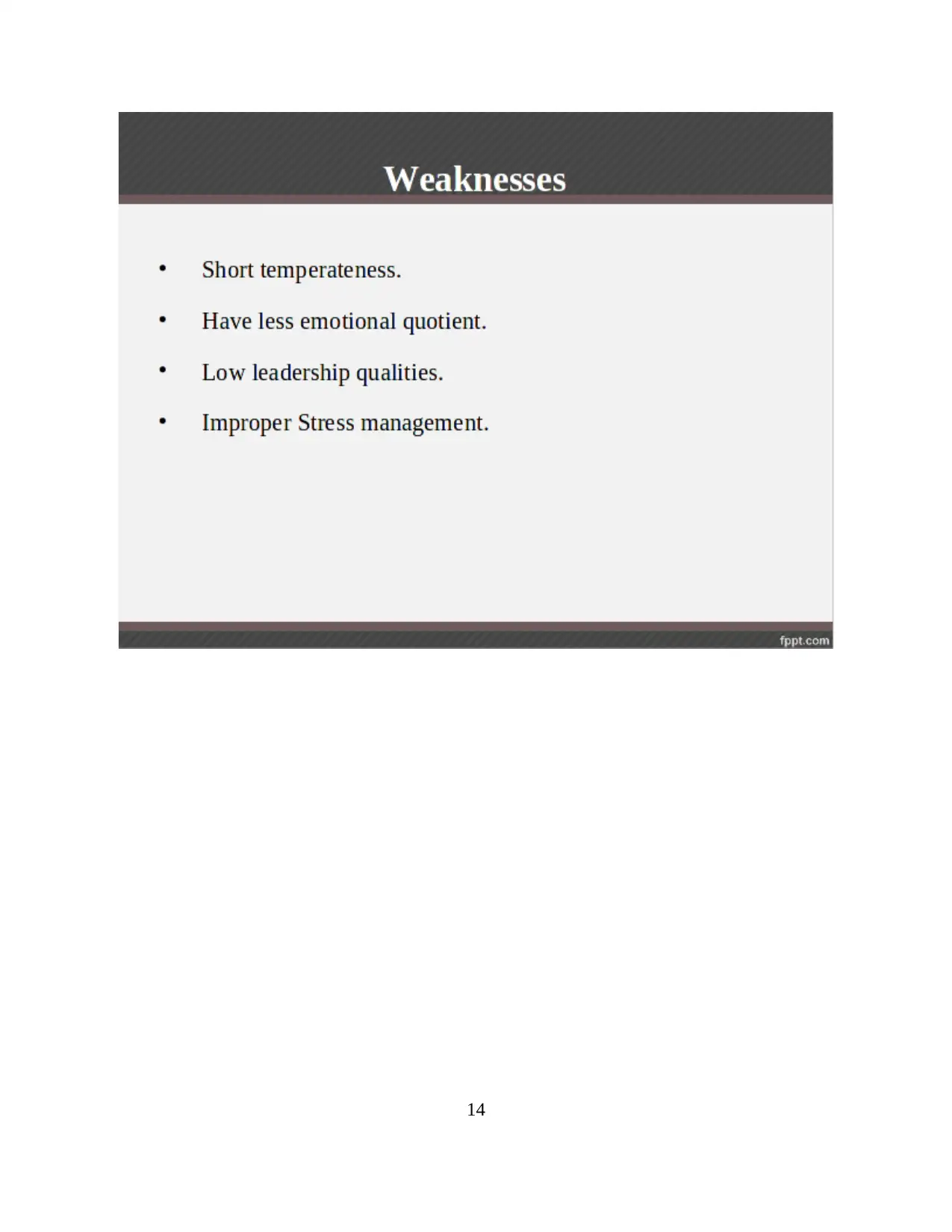
14
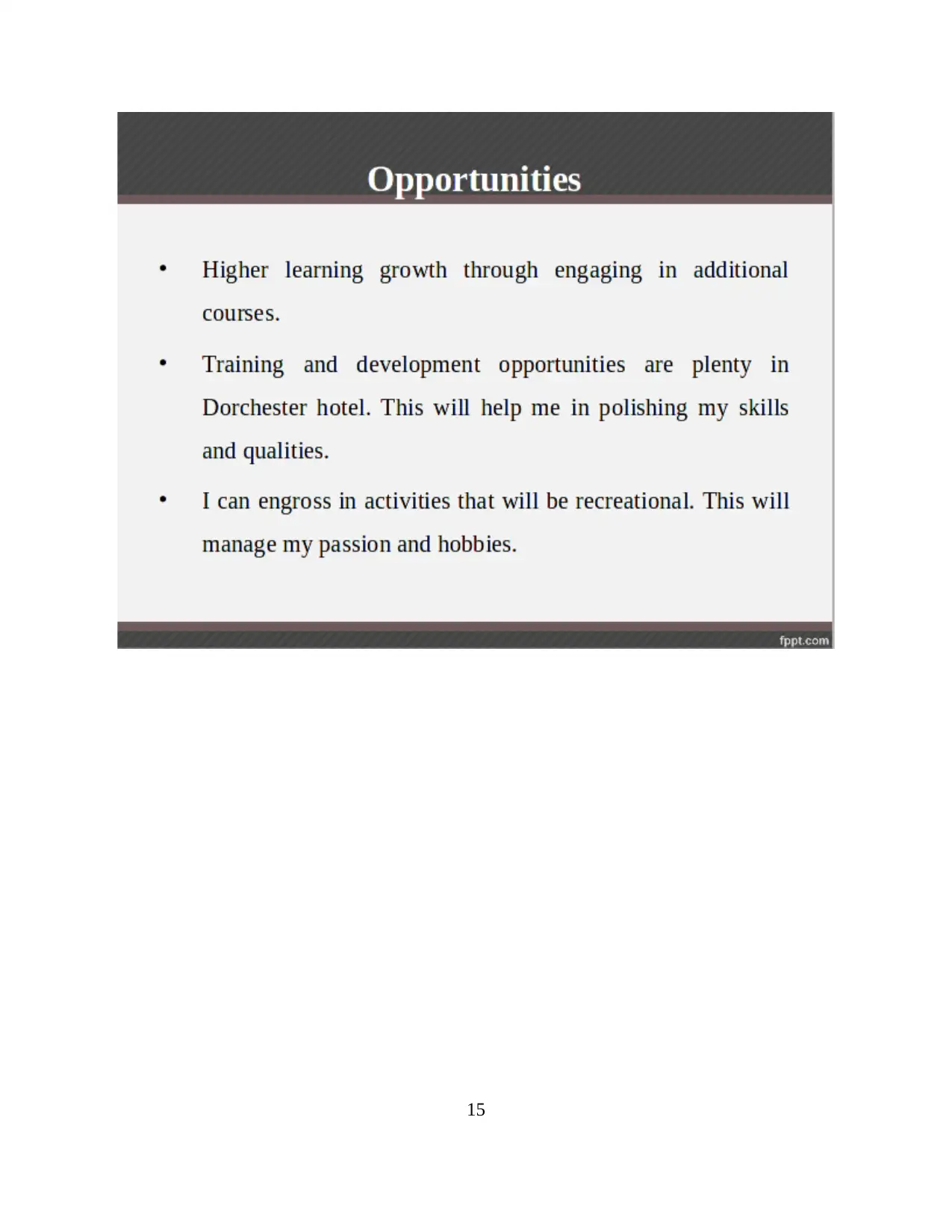
15
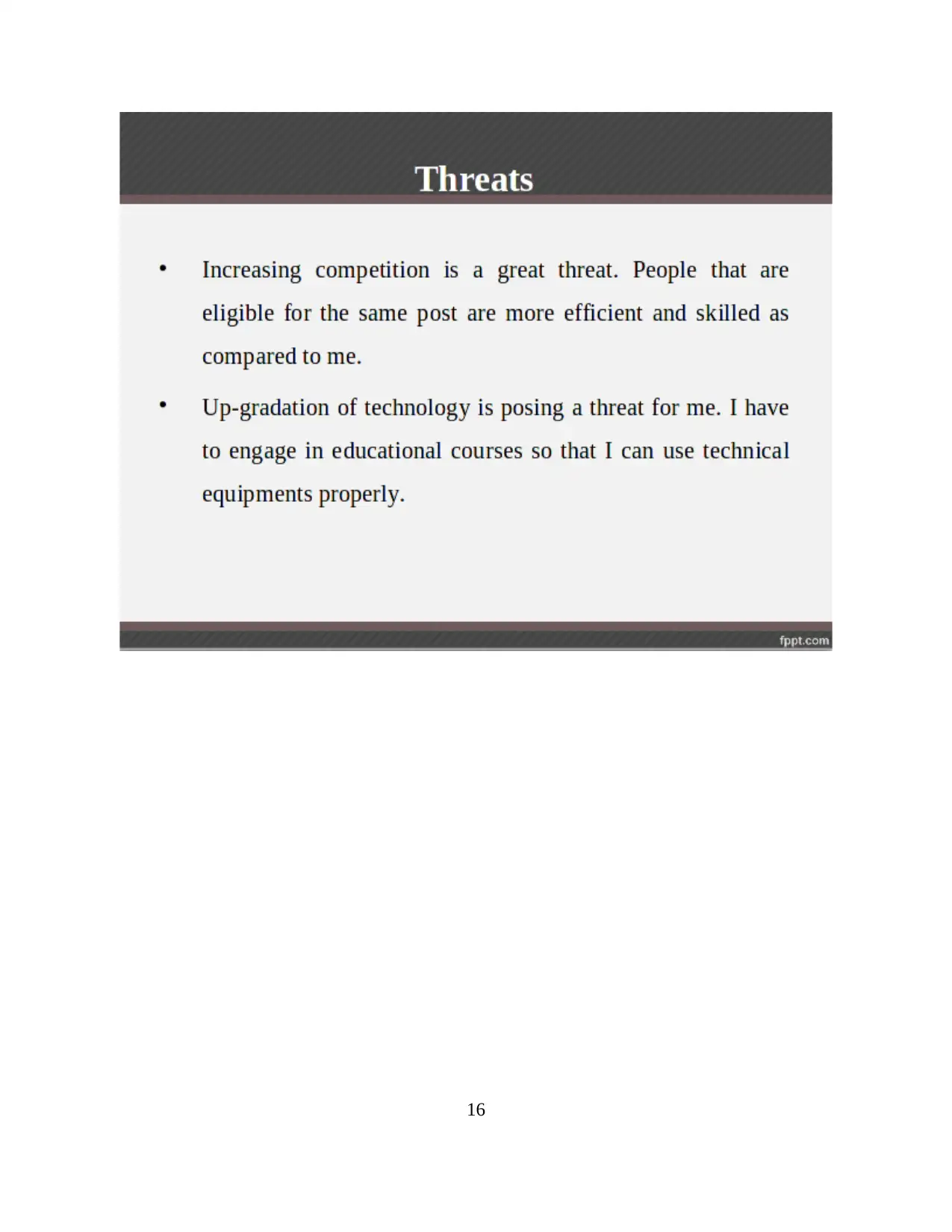
16
Secure Best Marks with AI Grader
Need help grading? Try our AI Grader for instant feedback on your assignments.
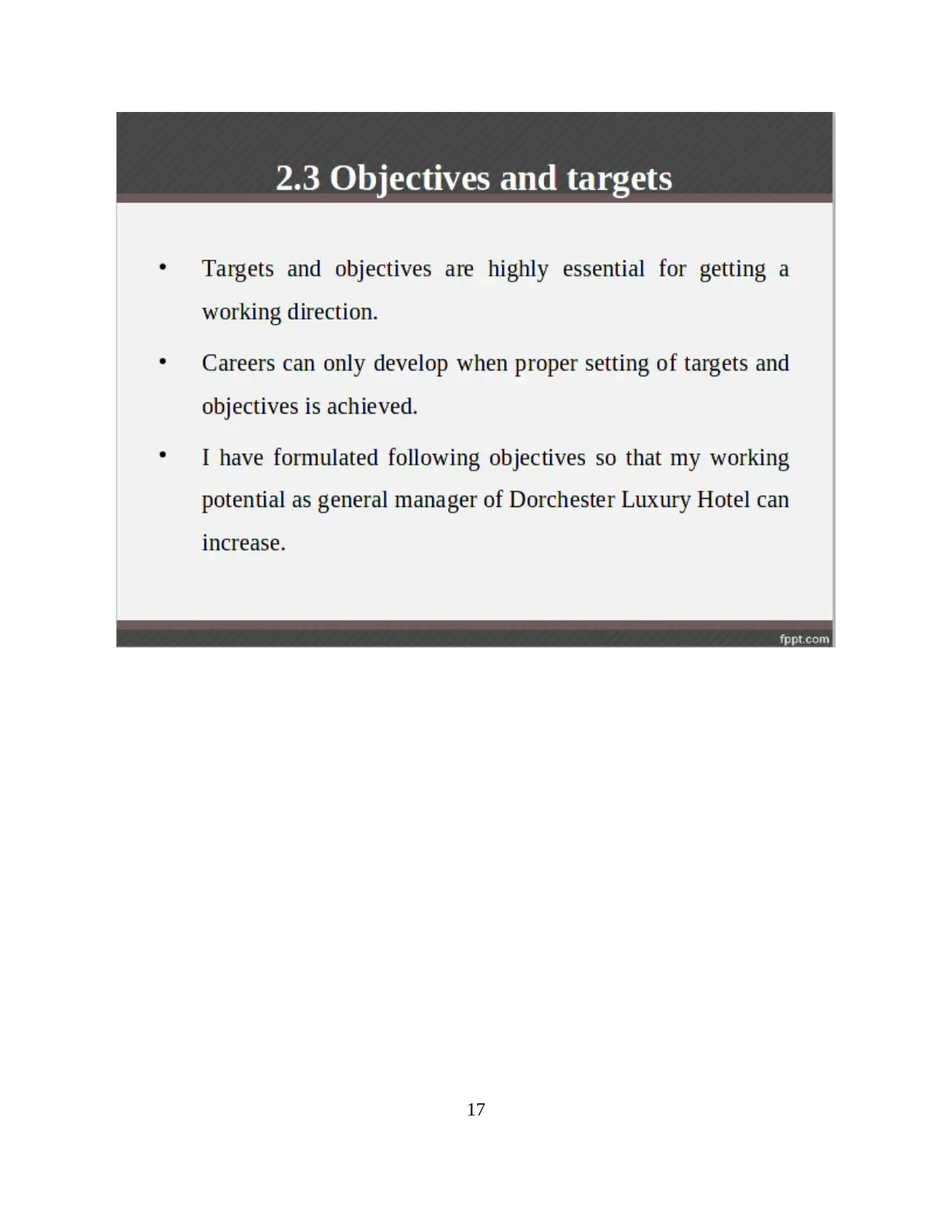
17
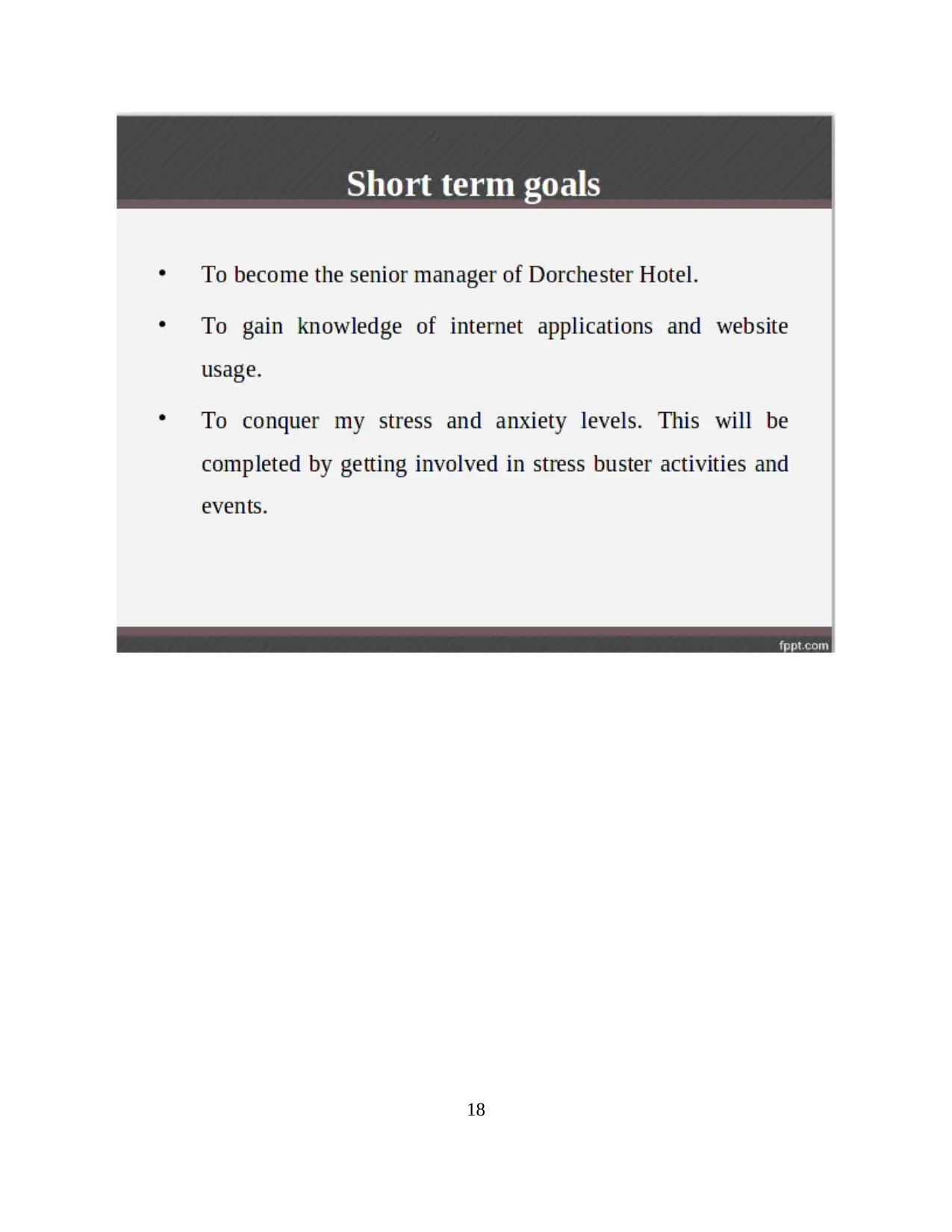
18
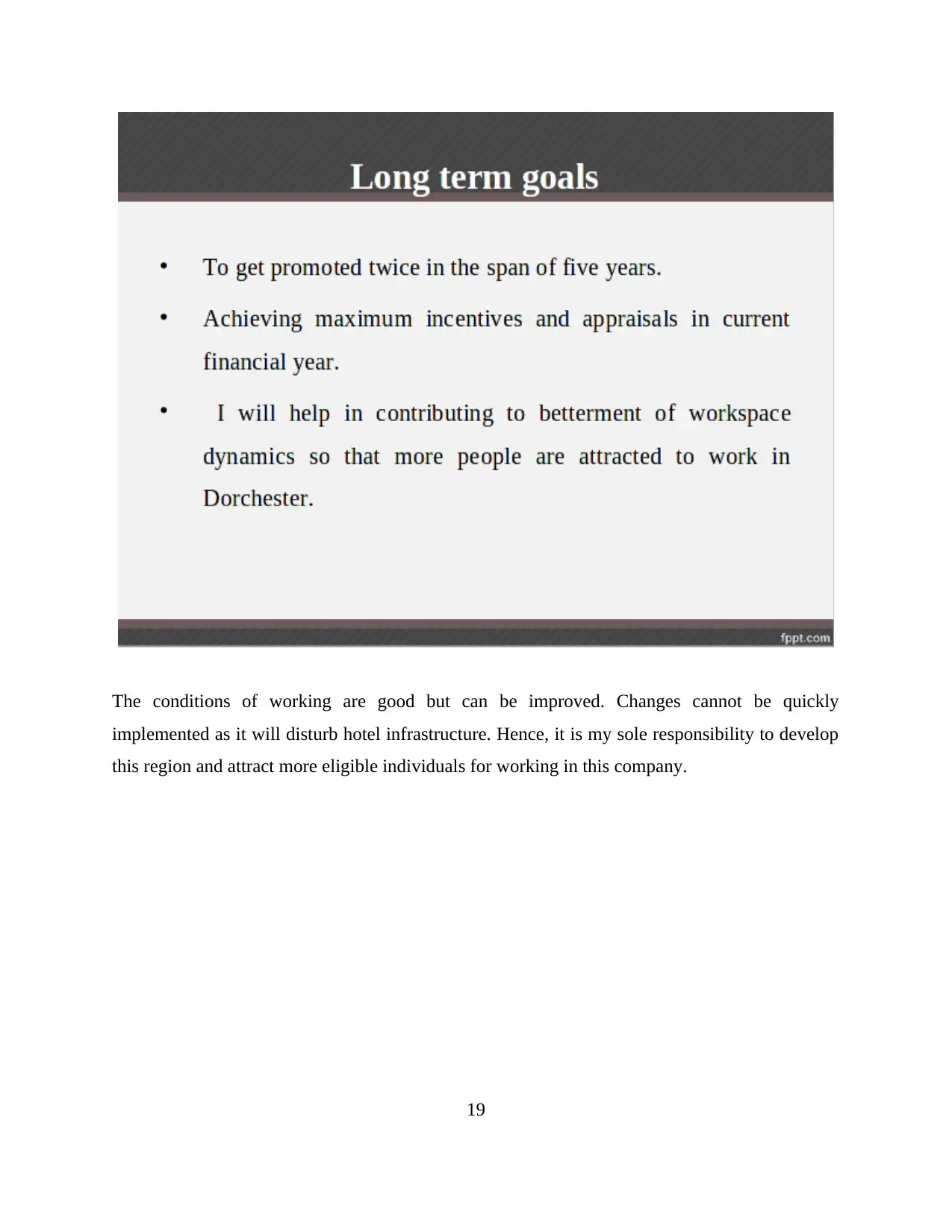
The conditions of working are good but can be improved. Changes cannot be quickly
implemented as it will disturb hotel infrastructure. Hence, it is my sole responsibility to develop
this region and attract more eligible individuals for working in this company.
19
implemented as it will disturb hotel infrastructure. Hence, it is my sole responsibility to develop
this region and attract more eligible individuals for working in this company.
19
Paraphrase This Document
Need a fresh take? Get an instant paraphrase of this document with our AI Paraphraser
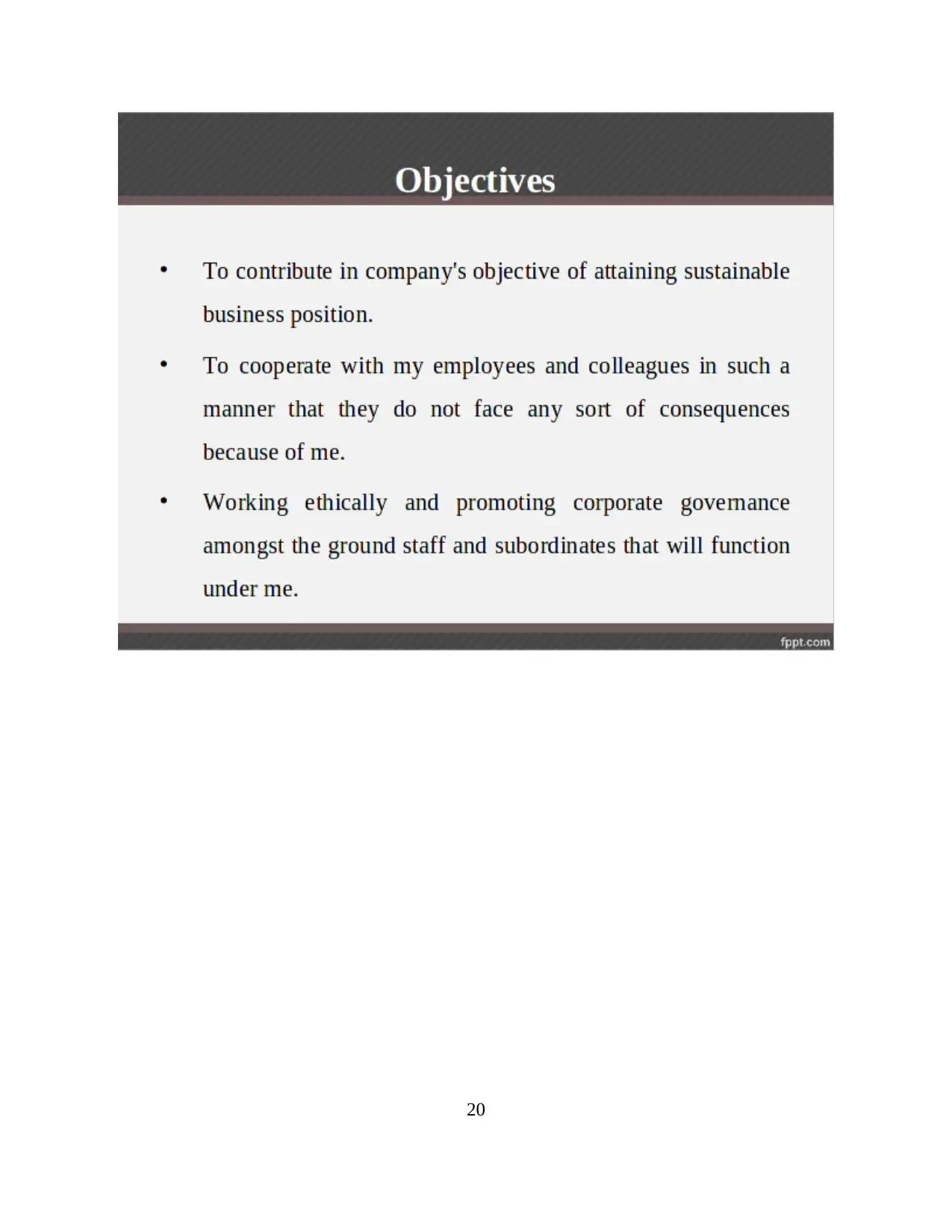
20
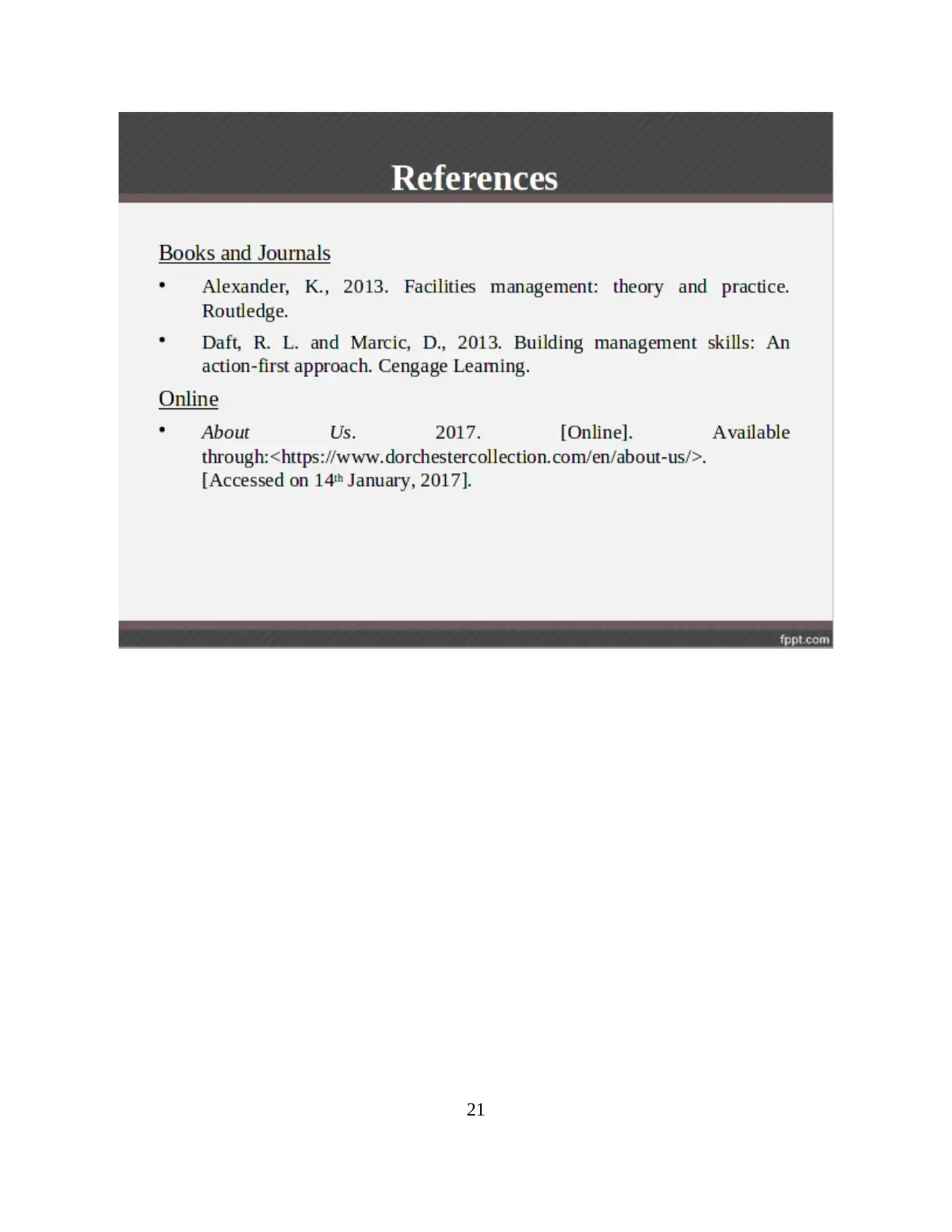
21
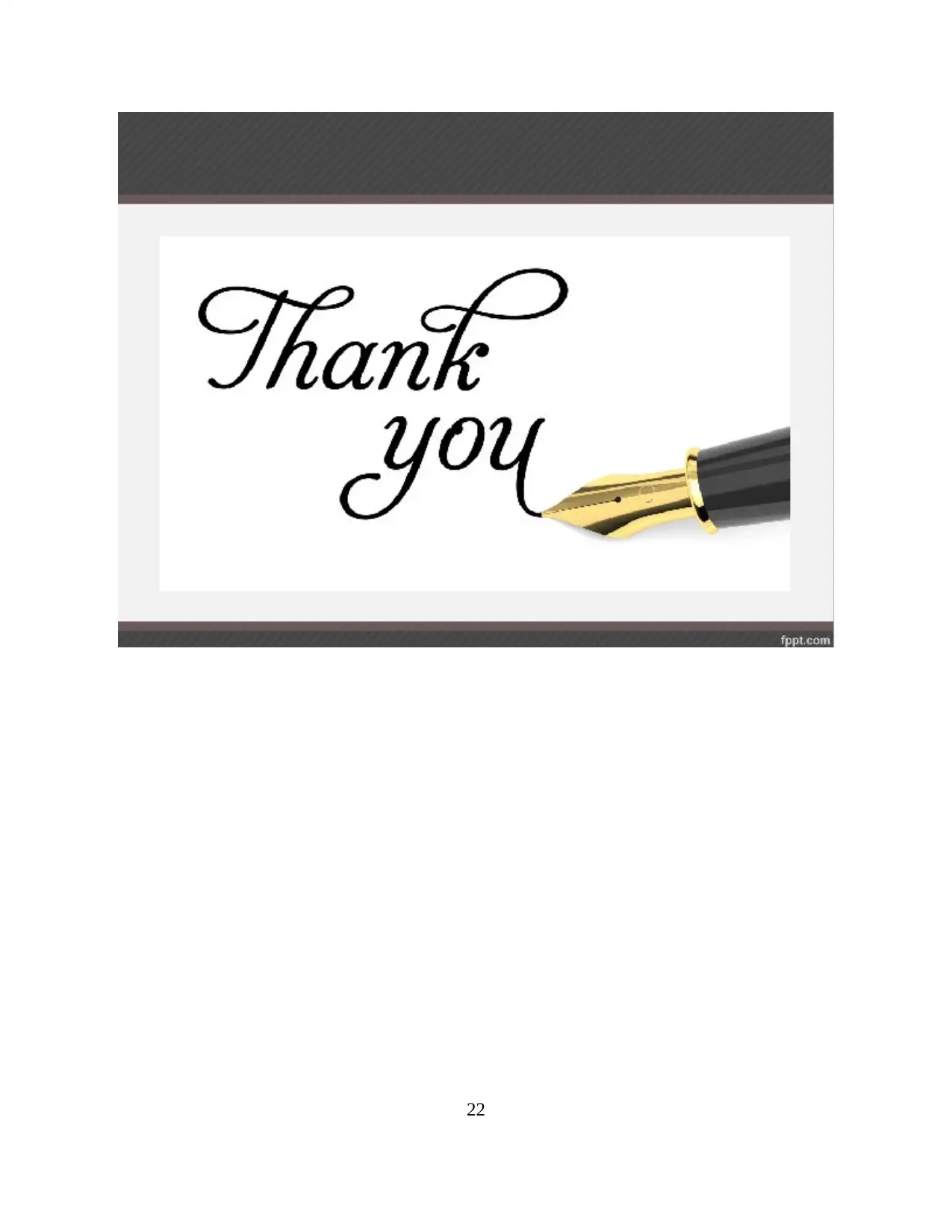
22
Secure Best Marks with AI Grader
Need help grading? Try our AI Grader for instant feedback on your assignments.
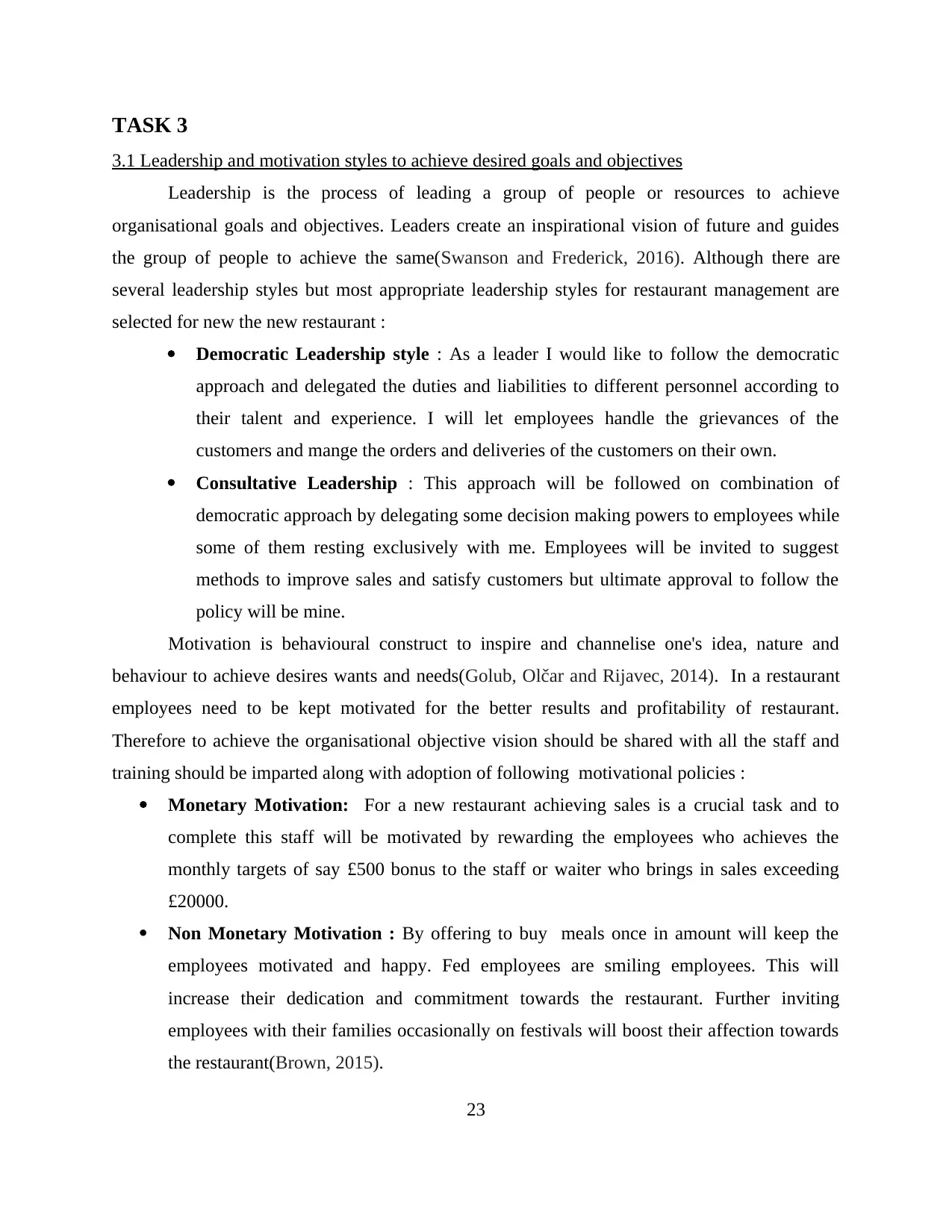
TASK 3
3.1 Leadership and motivation styles to achieve desired goals and objectives
Leadership is the process of leading a group of people or resources to achieve
organisational goals and objectives. Leaders create an inspirational vision of future and guides
the group of people to achieve the same(Swanson and Frederick, 2016). Although there are
several leadership styles but most appropriate leadership styles for restaurant management are
selected for new the new restaurant :
Democratic Leadership style : As a leader I would like to follow the democratic
approach and delegated the duties and liabilities to different personnel according to
their talent and experience. I will let employees handle the grievances of the
customers and mange the orders and deliveries of the customers on their own.
Consultative Leadership : This approach will be followed on combination of
democratic approach by delegating some decision making powers to employees while
some of them resting exclusively with me. Employees will be invited to suggest
methods to improve sales and satisfy customers but ultimate approval to follow the
policy will be mine.
Motivation is behavioural construct to inspire and channelise one's idea, nature and
behaviour to achieve desires wants and needs(Golub, Olčar and Rijavec, 2014). In a restaurant
employees need to be kept motivated for the better results and profitability of restaurant.
Therefore to achieve the organisational objective vision should be shared with all the staff and
training should be imparted along with adoption of following motivational policies :
Monetary Motivation: For a new restaurant achieving sales is a crucial task and to
complete this staff will be motivated by rewarding the employees who achieves the
monthly targets of say £500 bonus to the staff or waiter who brings in sales exceeding
£20000.
Non Monetary Motivation : By offering to buy meals once in amount will keep the
employees motivated and happy. Fed employees are smiling employees. This will
increase their dedication and commitment towards the restaurant. Further inviting
employees with their families occasionally on festivals will boost their affection towards
the restaurant(Brown, 2015).
23
3.1 Leadership and motivation styles to achieve desired goals and objectives
Leadership is the process of leading a group of people or resources to achieve
organisational goals and objectives. Leaders create an inspirational vision of future and guides
the group of people to achieve the same(Swanson and Frederick, 2016). Although there are
several leadership styles but most appropriate leadership styles for restaurant management are
selected for new the new restaurant :
Democratic Leadership style : As a leader I would like to follow the democratic
approach and delegated the duties and liabilities to different personnel according to
their talent and experience. I will let employees handle the grievances of the
customers and mange the orders and deliveries of the customers on their own.
Consultative Leadership : This approach will be followed on combination of
democratic approach by delegating some decision making powers to employees while
some of them resting exclusively with me. Employees will be invited to suggest
methods to improve sales and satisfy customers but ultimate approval to follow the
policy will be mine.
Motivation is behavioural construct to inspire and channelise one's idea, nature and
behaviour to achieve desires wants and needs(Golub, Olčar and Rijavec, 2014). In a restaurant
employees need to be kept motivated for the better results and profitability of restaurant.
Therefore to achieve the organisational objective vision should be shared with all the staff and
training should be imparted along with adoption of following motivational policies :
Monetary Motivation: For a new restaurant achieving sales is a crucial task and to
complete this staff will be motivated by rewarding the employees who achieves the
monthly targets of say £500 bonus to the staff or waiter who brings in sales exceeding
£20000.
Non Monetary Motivation : By offering to buy meals once in amount will keep the
employees motivated and happy. Fed employees are smiling employees. This will
increase their dedication and commitment towards the restaurant. Further inviting
employees with their families occasionally on festivals will boost their affection towards
the restaurant(Brown, 2015).
23
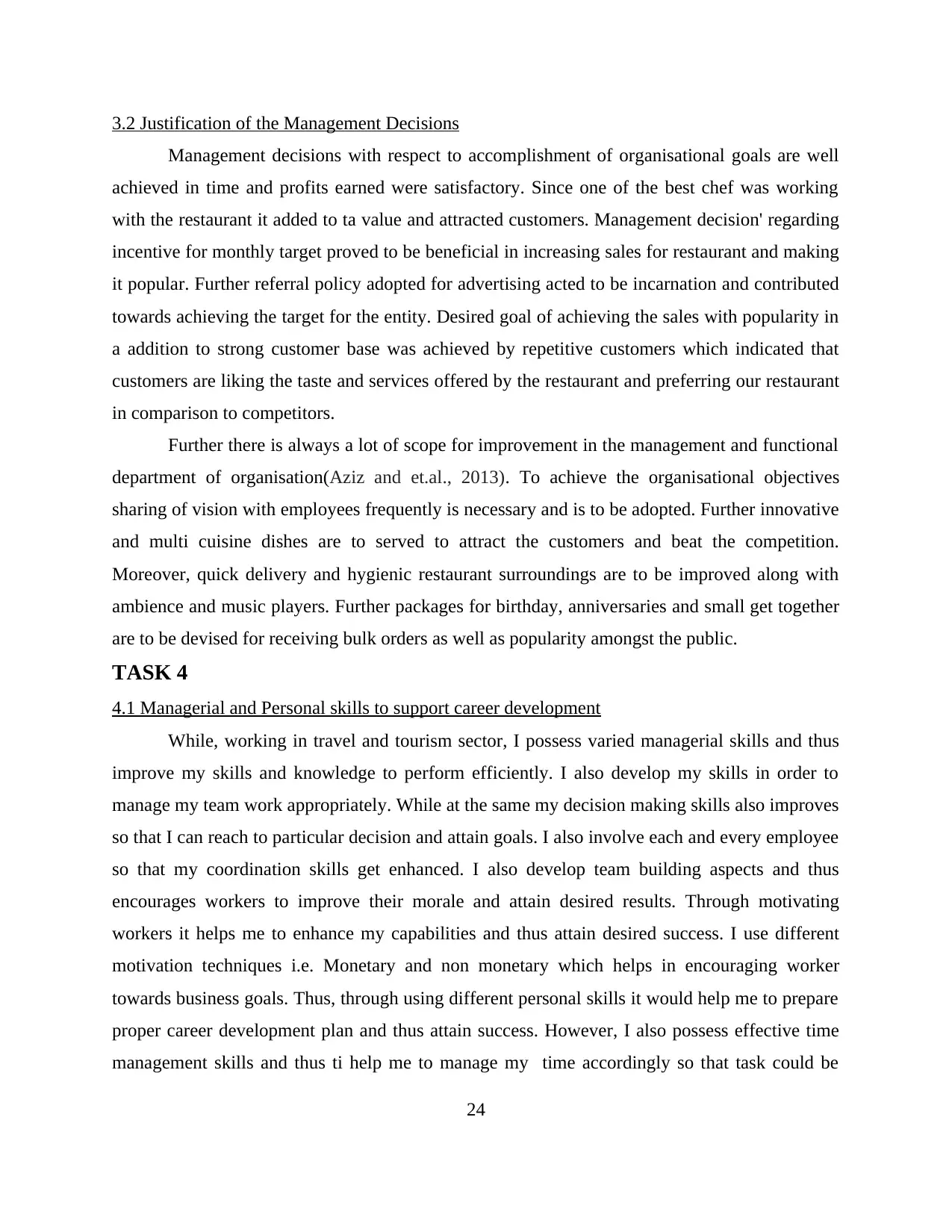
3.2 Justification of the Management Decisions
Management decisions with respect to accomplishment of organisational goals are well
achieved in time and profits earned were satisfactory. Since one of the best chef was working
with the restaurant it added to ta value and attracted customers. Management decision' regarding
incentive for monthly target proved to be beneficial in increasing sales for restaurant and making
it popular. Further referral policy adopted for advertising acted to be incarnation and contributed
towards achieving the target for the entity. Desired goal of achieving the sales with popularity in
a addition to strong customer base was achieved by repetitive customers which indicated that
customers are liking the taste and services offered by the restaurant and preferring our restaurant
in comparison to competitors.
Further there is always a lot of scope for improvement in the management and functional
department of organisation(Aziz and et.al., 2013). To achieve the organisational objectives
sharing of vision with employees frequently is necessary and is to be adopted. Further innovative
and multi cuisine dishes are to served to attract the customers and beat the competition.
Moreover, quick delivery and hygienic restaurant surroundings are to be improved along with
ambience and music players. Further packages for birthday, anniversaries and small get together
are to be devised for receiving bulk orders as well as popularity amongst the public.
TASK 4
4.1 Managerial and Personal skills to support career development
While, working in travel and tourism sector, I possess varied managerial skills and thus
improve my skills and knowledge to perform efficiently. I also develop my skills in order to
manage my team work appropriately. While at the same my decision making skills also improves
so that I can reach to particular decision and attain goals. I also involve each and every employee
so that my coordination skills get enhanced. I also develop team building aspects and thus
encourages workers to improve their morale and attain desired results. Through motivating
workers it helps me to enhance my capabilities and thus attain desired success. I use different
motivation techniques i.e. Monetary and non monetary which helps in encouraging worker
towards business goals. Thus, through using different personal skills it would help me to prepare
proper career development plan and thus attain success. However, I also possess effective time
management skills and thus ti help me to manage my time accordingly so that task could be
24
Management decisions with respect to accomplishment of organisational goals are well
achieved in time and profits earned were satisfactory. Since one of the best chef was working
with the restaurant it added to ta value and attracted customers. Management decision' regarding
incentive for monthly target proved to be beneficial in increasing sales for restaurant and making
it popular. Further referral policy adopted for advertising acted to be incarnation and contributed
towards achieving the target for the entity. Desired goal of achieving the sales with popularity in
a addition to strong customer base was achieved by repetitive customers which indicated that
customers are liking the taste and services offered by the restaurant and preferring our restaurant
in comparison to competitors.
Further there is always a lot of scope for improvement in the management and functional
department of organisation(Aziz and et.al., 2013). To achieve the organisational objectives
sharing of vision with employees frequently is necessary and is to be adopted. Further innovative
and multi cuisine dishes are to served to attract the customers and beat the competition.
Moreover, quick delivery and hygienic restaurant surroundings are to be improved along with
ambience and music players. Further packages for birthday, anniversaries and small get together
are to be devised for receiving bulk orders as well as popularity amongst the public.
TASK 4
4.1 Managerial and Personal skills to support career development
While, working in travel and tourism sector, I possess varied managerial skills and thus
improve my skills and knowledge to perform efficiently. I also develop my skills in order to
manage my team work appropriately. While at the same my decision making skills also improves
so that I can reach to particular decision and attain goals. I also involve each and every employee
so that my coordination skills get enhanced. I also develop team building aspects and thus
encourages workers to improve their morale and attain desired results. Through motivating
workers it helps me to enhance my capabilities and thus attain desired success. I use different
motivation techniques i.e. Monetary and non monetary which helps in encouraging worker
towards business goals. Thus, through using different personal skills it would help me to prepare
proper career development plan and thus attain success. However, I also possess effective time
management skills and thus ti help me to manage my time accordingly so that task could be
24
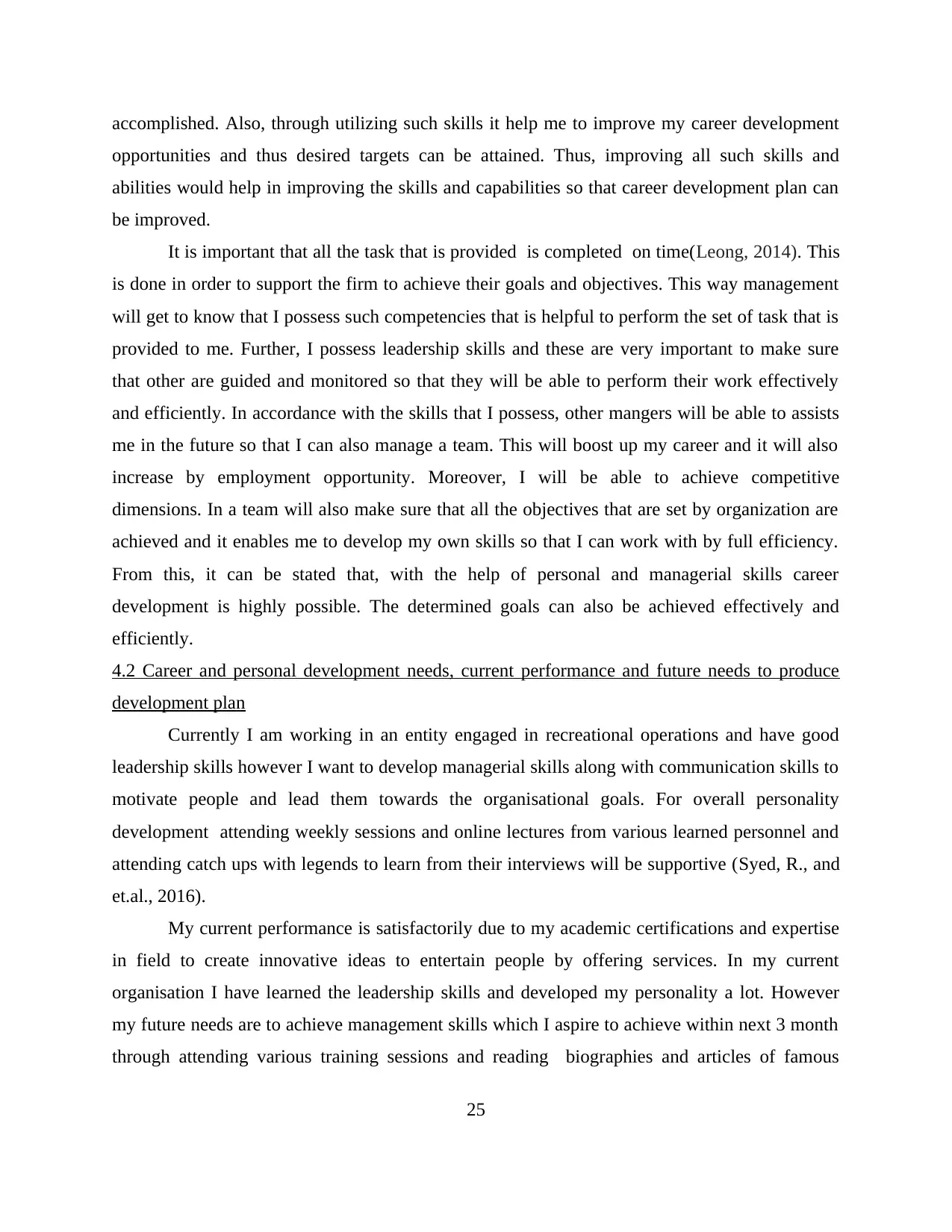
accomplished. Also, through utilizing such skills it help me to improve my career development
opportunities and thus desired targets can be attained. Thus, improving all such skills and
abilities would help in improving the skills and capabilities so that career development plan can
be improved.
It is important that all the task that is provided is completed on time(Leong, 2014). This
is done in order to support the firm to achieve their goals and objectives. This way management
will get to know that I possess such competencies that is helpful to perform the set of task that is
provided to me. Further, I possess leadership skills and these are very important to make sure
that other are guided and monitored so that they will be able to perform their work effectively
and efficiently. In accordance with the skills that I possess, other mangers will be able to assists
me in the future so that I can also manage a team. This will boost up my career and it will also
increase by employment opportunity. Moreover, I will be able to achieve competitive
dimensions. In a team will also make sure that all the objectives that are set by organization are
achieved and it enables me to develop my own skills so that I can work with by full efficiency.
From this, it can be stated that, with the help of personal and managerial skills career
development is highly possible. The determined goals can also be achieved effectively and
efficiently.
4.2 Career and personal development needs, current performance and future needs to produce
development plan
Currently I am working in an entity engaged in recreational operations and have good
leadership skills however I want to develop managerial skills along with communication skills to
motivate people and lead them towards the organisational goals. For overall personality
development attending weekly sessions and online lectures from various learned personnel and
attending catch ups with legends to learn from their interviews will be supportive (Syed, R., and
et.al., 2016).
My current performance is satisfactorily due to my academic certifications and expertise
in field to create innovative ideas to entertain people by offering services. In my current
organisation I have learned the leadership skills and developed my personality a lot. However
my future needs are to achieve management skills which I aspire to achieve within next 3 month
through attending various training sessions and reading biographies and articles of famous
25
opportunities and thus desired targets can be attained. Thus, improving all such skills and
abilities would help in improving the skills and capabilities so that career development plan can
be improved.
It is important that all the task that is provided is completed on time(Leong, 2014). This
is done in order to support the firm to achieve their goals and objectives. This way management
will get to know that I possess such competencies that is helpful to perform the set of task that is
provided to me. Further, I possess leadership skills and these are very important to make sure
that other are guided and monitored so that they will be able to perform their work effectively
and efficiently. In accordance with the skills that I possess, other mangers will be able to assists
me in the future so that I can also manage a team. This will boost up my career and it will also
increase by employment opportunity. Moreover, I will be able to achieve competitive
dimensions. In a team will also make sure that all the objectives that are set by organization are
achieved and it enables me to develop my own skills so that I can work with by full efficiency.
From this, it can be stated that, with the help of personal and managerial skills career
development is highly possible. The determined goals can also be achieved effectively and
efficiently.
4.2 Career and personal development needs, current performance and future needs to produce
development plan
Currently I am working in an entity engaged in recreational operations and have good
leadership skills however I want to develop managerial skills along with communication skills to
motivate people and lead them towards the organisational goals. For overall personality
development attending weekly sessions and online lectures from various learned personnel and
attending catch ups with legends to learn from their interviews will be supportive (Syed, R., and
et.al., 2016).
My current performance is satisfactorily due to my academic certifications and expertise
in field to create innovative ideas to entertain people by offering services. In my current
organisation I have learned the leadership skills and developed my personality a lot. However
my future needs are to achieve management skills which I aspire to achieve within next 3 month
through attending various training sessions and reading biographies and articles of famous
25
Paraphrase This Document
Need a fresh take? Get an instant paraphrase of this document with our AI Paraphraser
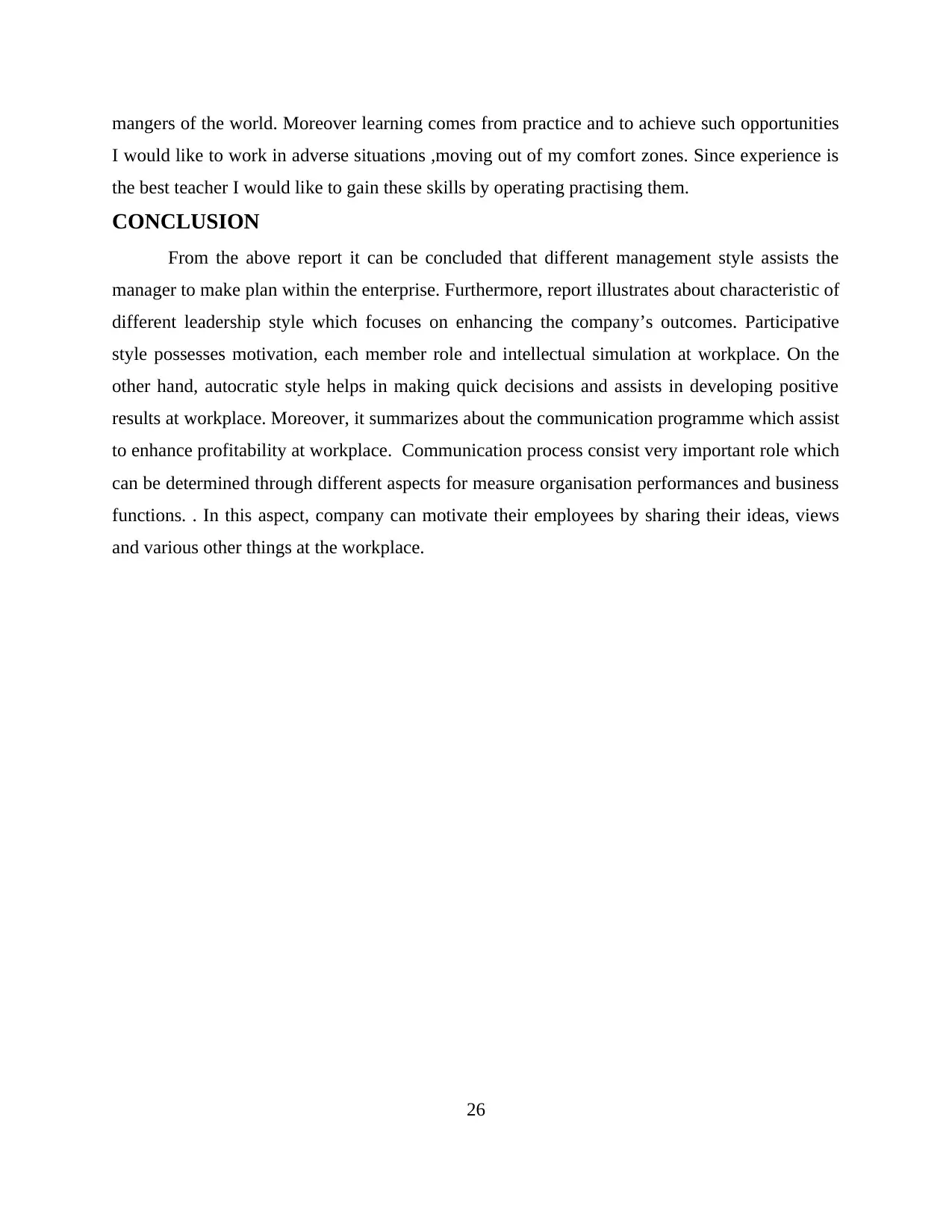
mangers of the world. Moreover learning comes from practice and to achieve such opportunities
I would like to work in adverse situations ,moving out of my comfort zones. Since experience is
the best teacher I would like to gain these skills by operating practising them.
CONCLUSION
From the above report it can be concluded that different management style assists the
manager to make plan within the enterprise. Furthermore, report illustrates about characteristic of
different leadership style which focuses on enhancing the company’s outcomes. Participative
style possesses motivation, each member role and intellectual simulation at workplace. On the
other hand, autocratic style helps in making quick decisions and assists in developing positive
results at workplace. Moreover, it summarizes about the communication programme which assist
to enhance profitability at workplace. Communication process consist very important role which
can be determined through different aspects for measure organisation performances and business
functions. . In this aspect, company can motivate their employees by sharing their ideas, views
and various other things at the workplace.
26
I would like to work in adverse situations ,moving out of my comfort zones. Since experience is
the best teacher I would like to gain these skills by operating practising them.
CONCLUSION
From the above report it can be concluded that different management style assists the
manager to make plan within the enterprise. Furthermore, report illustrates about characteristic of
different leadership style which focuses on enhancing the company’s outcomes. Participative
style possesses motivation, each member role and intellectual simulation at workplace. On the
other hand, autocratic style helps in making quick decisions and assists in developing positive
results at workplace. Moreover, it summarizes about the communication programme which assist
to enhance profitability at workplace. Communication process consist very important role which
can be determined through different aspects for measure organisation performances and business
functions. . In this aspect, company can motivate their employees by sharing their ideas, views
and various other things at the workplace.
26
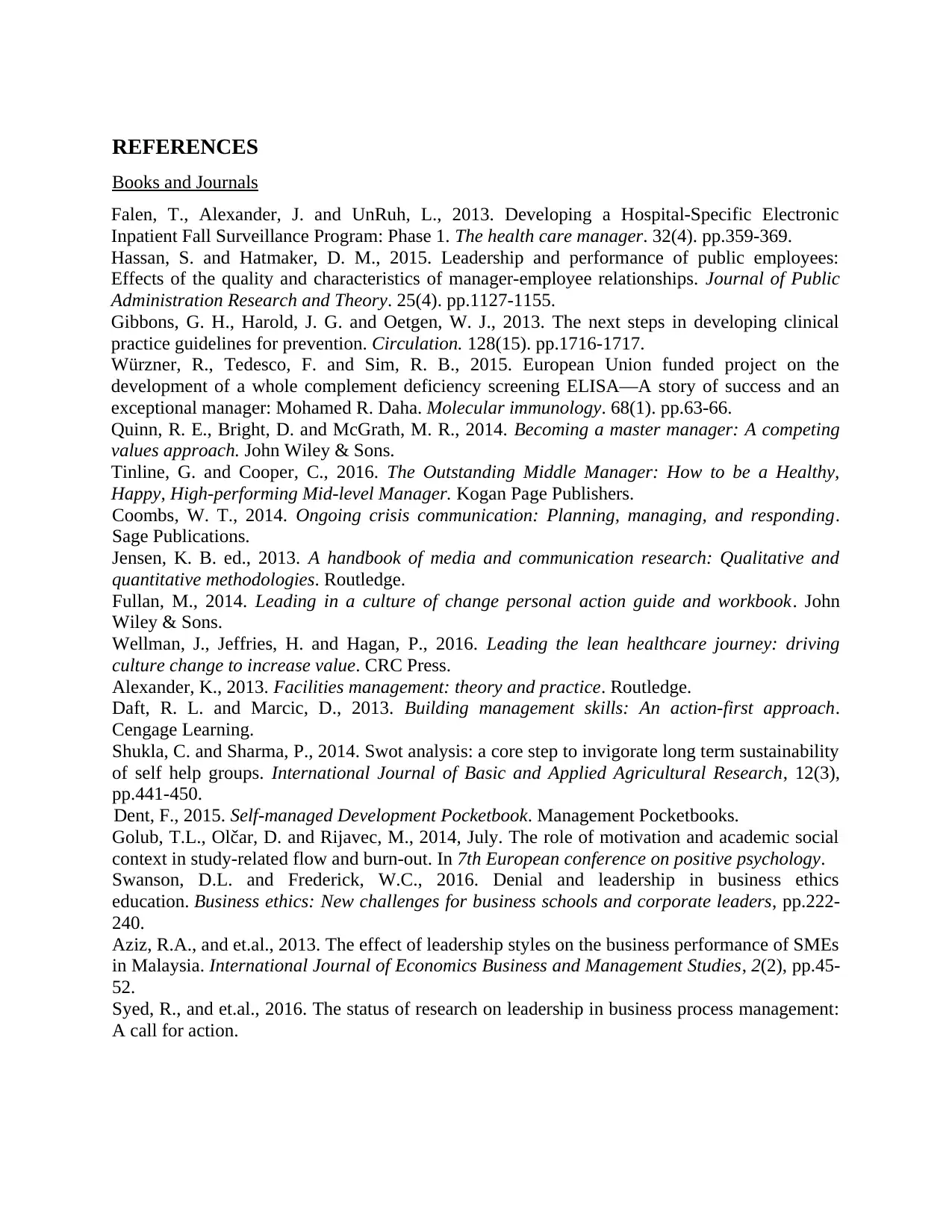
REFERENCES
Books and Journals
Falen, T., Alexander, J. and UnRuh, L., 2013. Developing a Hospital-Specific Electronic
Inpatient Fall Surveillance Program: Phase 1. The health care manager. 32(4). pp.359-369.
Hassan, S. and Hatmaker, D. M., 2015. Leadership and performance of public employees:
Effects of the quality and characteristics of manager-employee relationships. Journal of Public
Administration Research and Theory. 25(4). pp.1127-1155.
Gibbons, G. H., Harold, J. G. and Oetgen, W. J., 2013. The next steps in developing clinical
practice guidelines for prevention. Circulation. 128(15). pp.1716-1717.
Würzner, R., Tedesco, F. and Sim, R. B., 2015. European Union funded project on the
development of a whole complement deficiency screening ELISA—A story of success and an
exceptional manager: Mohamed R. Daha. Molecular immunology. 68(1). pp.63-66.
Quinn, R. E., Bright, D. and McGrath, M. R., 2014. Becoming a master manager: A competing
values approach. John Wiley & Sons.
Tinline, G. and Cooper, C., 2016. The Outstanding Middle Manager: How to be a Healthy,
Happy, High-performing Mid-level Manager. Kogan Page Publishers.
Coombs, W. T., 2014. Ongoing crisis communication: Planning, managing, and responding.
Sage Publications.
Jensen, K. B. ed., 2013. A handbook of media and communication research: Qualitative and
quantitative methodologies. Routledge.
Fullan, M., 2014. Leading in a culture of change personal action guide and workbook. John
Wiley & Sons.
Wellman, J., Jeffries, H. and Hagan, P., 2016. Leading the lean healthcare journey: driving
culture change to increase value. CRC Press.
Alexander, K., 2013. Facilities management: theory and practice. Routledge.
Daft, R. L. and Marcic, D., 2013. Building management skills: An action-first approach.
Cengage Learning.
Shukla, C. and Sharma, P., 2014. Swot analysis: a core step to invigorate long term sustainability
of self help groups. International Journal of Basic and Applied Agricultural Research, 12(3),
pp.441-450.
Dent, F., 2015. Self-managed Development Pocketbook. Management Pocketbooks.
Golub, T.L., Olčar, D. and Rijavec, M., 2014, July. The role of motivation and academic social
context in study-related flow and burn-out. In 7th European conference on positive psychology.
Swanson, D.L. and Frederick, W.C., 2016. Denial and leadership in business ethics
education. Business ethics: New challenges for business schools and corporate leaders, pp.222-
240.
Aziz, R.A., and et.al., 2013. The effect of leadership styles on the business performance of SMEs
in Malaysia. International Journal of Economics Business and Management Studies, 2(2), pp.45-
52.
Syed, R., and et.al., 2016. The status of research on leadership in business process management:
A call for action.
Books and Journals
Falen, T., Alexander, J. and UnRuh, L., 2013. Developing a Hospital-Specific Electronic
Inpatient Fall Surveillance Program: Phase 1. The health care manager. 32(4). pp.359-369.
Hassan, S. and Hatmaker, D. M., 2015. Leadership and performance of public employees:
Effects of the quality and characteristics of manager-employee relationships. Journal of Public
Administration Research and Theory. 25(4). pp.1127-1155.
Gibbons, G. H., Harold, J. G. and Oetgen, W. J., 2013. The next steps in developing clinical
practice guidelines for prevention. Circulation. 128(15). pp.1716-1717.
Würzner, R., Tedesco, F. and Sim, R. B., 2015. European Union funded project on the
development of a whole complement deficiency screening ELISA—A story of success and an
exceptional manager: Mohamed R. Daha. Molecular immunology. 68(1). pp.63-66.
Quinn, R. E., Bright, D. and McGrath, M. R., 2014. Becoming a master manager: A competing
values approach. John Wiley & Sons.
Tinline, G. and Cooper, C., 2016. The Outstanding Middle Manager: How to be a Healthy,
Happy, High-performing Mid-level Manager. Kogan Page Publishers.
Coombs, W. T., 2014. Ongoing crisis communication: Planning, managing, and responding.
Sage Publications.
Jensen, K. B. ed., 2013. A handbook of media and communication research: Qualitative and
quantitative methodologies. Routledge.
Fullan, M., 2014. Leading in a culture of change personal action guide and workbook. John
Wiley & Sons.
Wellman, J., Jeffries, H. and Hagan, P., 2016. Leading the lean healthcare journey: driving
culture change to increase value. CRC Press.
Alexander, K., 2013. Facilities management: theory and practice. Routledge.
Daft, R. L. and Marcic, D., 2013. Building management skills: An action-first approach.
Cengage Learning.
Shukla, C. and Sharma, P., 2014. Swot analysis: a core step to invigorate long term sustainability
of self help groups. International Journal of Basic and Applied Agricultural Research, 12(3),
pp.441-450.
Dent, F., 2015. Self-managed Development Pocketbook. Management Pocketbooks.
Golub, T.L., Olčar, D. and Rijavec, M., 2014, July. The role of motivation and academic social
context in study-related flow and burn-out. In 7th European conference on positive psychology.
Swanson, D.L. and Frederick, W.C., 2016. Denial and leadership in business ethics
education. Business ethics: New challenges for business schools and corporate leaders, pp.222-
240.
Aziz, R.A., and et.al., 2013. The effect of leadership styles on the business performance of SMEs
in Malaysia. International Journal of Economics Business and Management Studies, 2(2), pp.45-
52.
Syed, R., and et.al., 2016. The status of research on leadership in business process management:
A call for action.
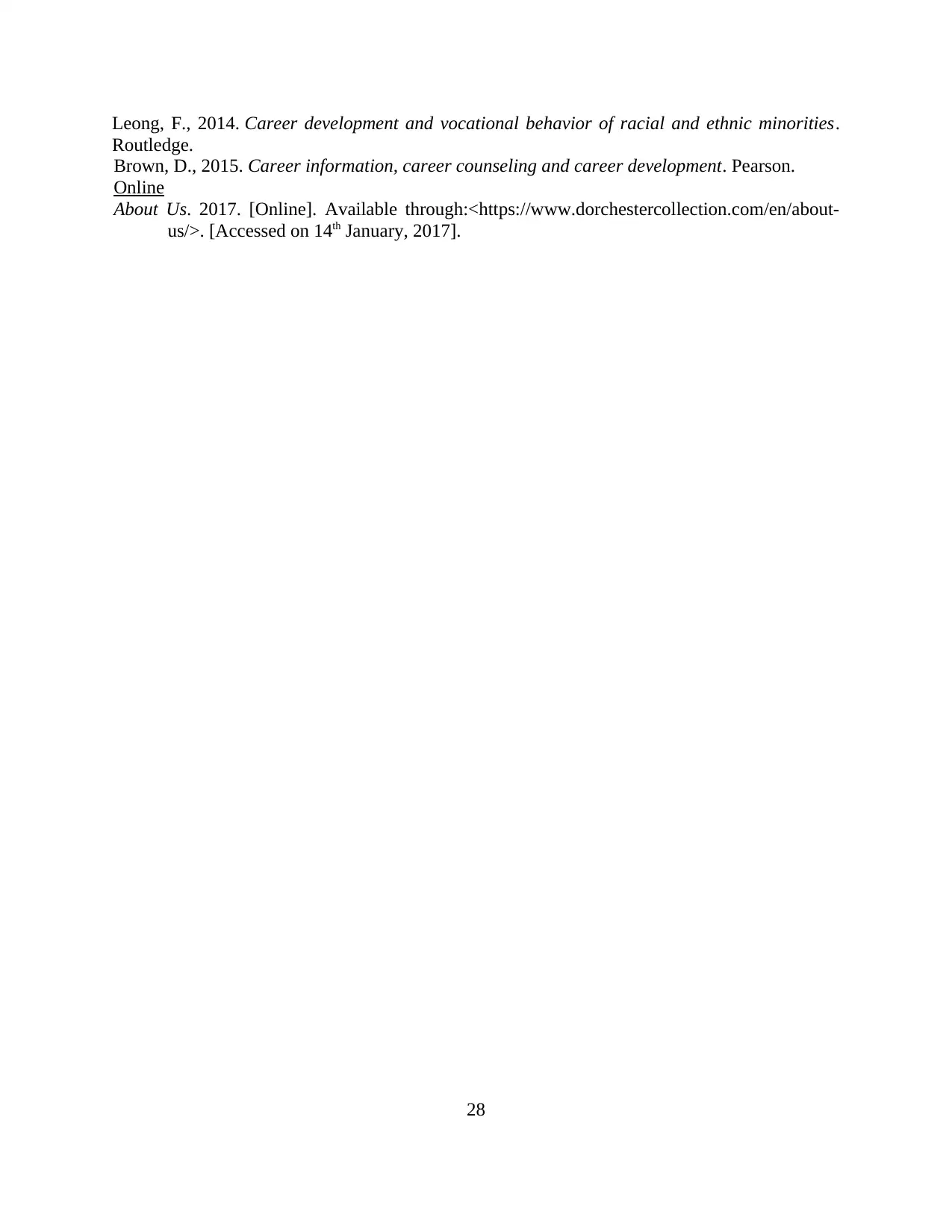
Leong, F., 2014. Career development and vocational behavior of racial and ethnic minorities.
Routledge.
Brown, D., 2015. Career information, career counseling and career development. Pearson.
Online
About Us. 2017. [Online]. Available through:<https://www.dorchestercollection.com/en/about-
us/>. [Accessed on 14th January, 2017].
28
Routledge.
Brown, D., 2015. Career information, career counseling and career development. Pearson.
Online
About Us. 2017. [Online]. Available through:<https://www.dorchestercollection.com/en/about-
us/>. [Accessed on 14th January, 2017].
28
1 out of 28
Related Documents
Your All-in-One AI-Powered Toolkit for Academic Success.
+13062052269
info@desklib.com
Available 24*7 on WhatsApp / Email
![[object Object]](/_next/static/media/star-bottom.7253800d.svg)
Unlock your academic potential
© 2024 | Zucol Services PVT LTD | All rights reserved.





